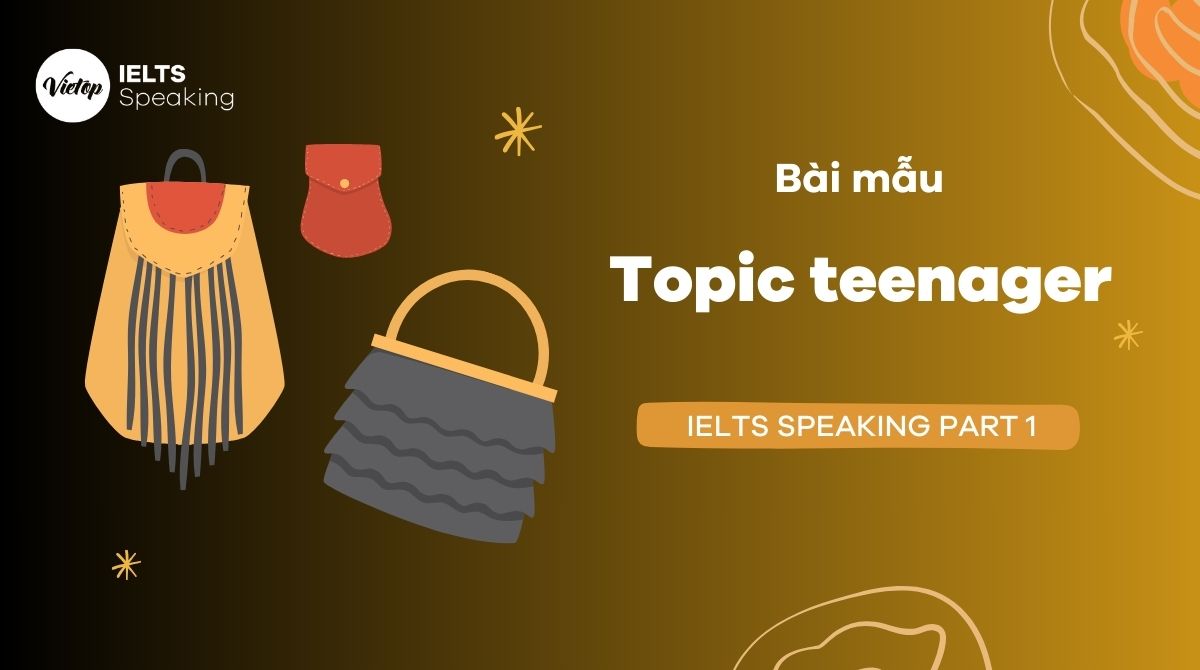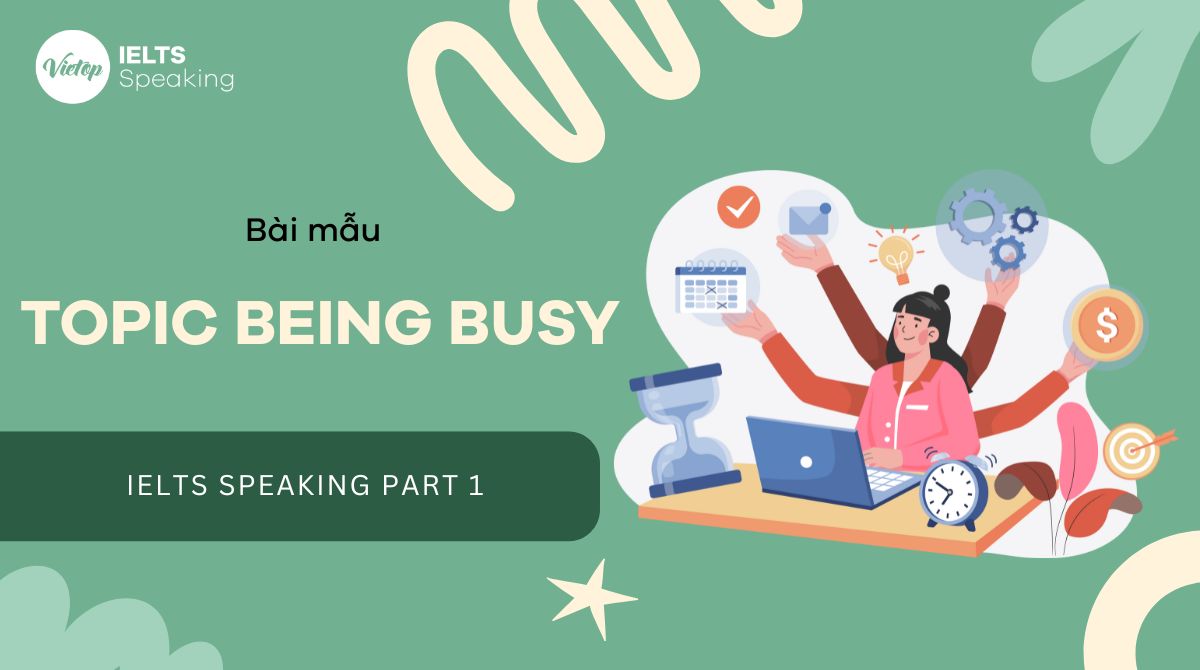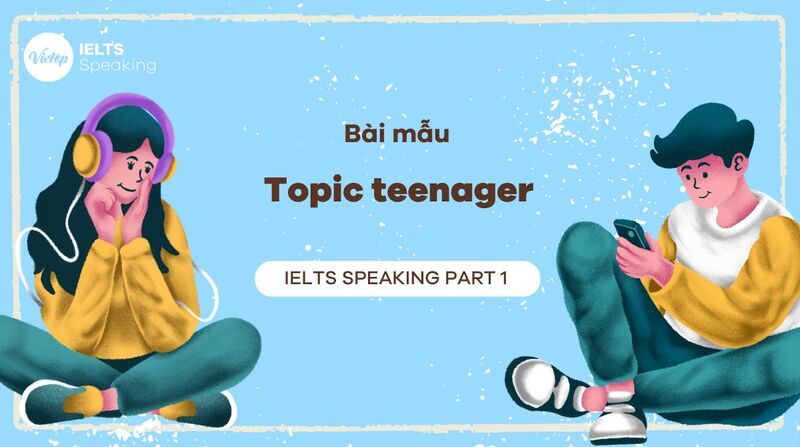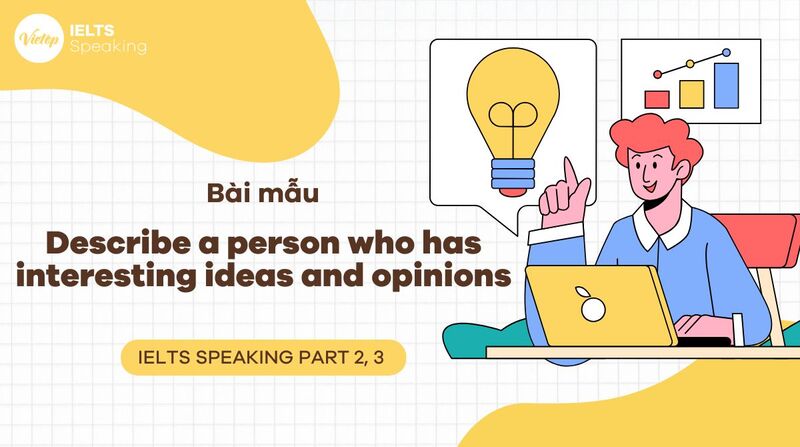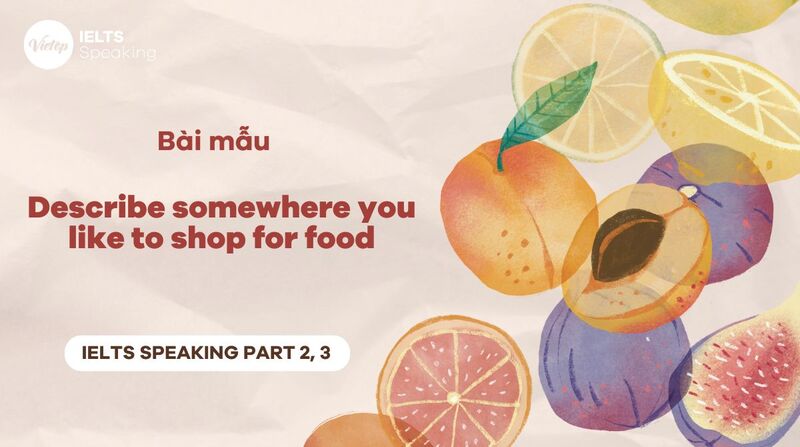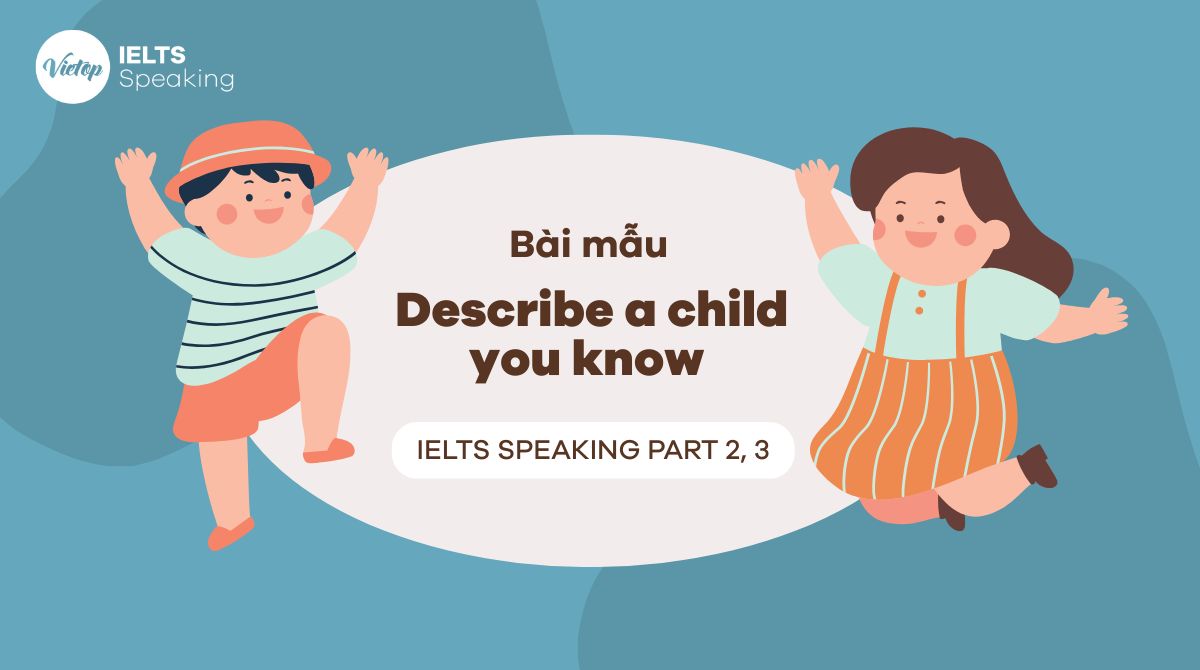IELTS Speaking luôn được xem là phần thi đầy thử thách, bởi không chỉ đòi hỏi vốn từ vựng và ngữ pháp, mà còn yêu cầu khả năng phản xạ, tư duy logic và sự tự tin khi giao tiếp. Năm 2022 nhiều đề thi Speaking được đánh giá có độ bám sát thực tiễn, xoay quanh các chủ đề quen thuộc nhưng vẫn có độ khó nhất định để kiểm tra năng lực ứng viên.
Trong bài viết này, Vietop sẽ tổng hợp giải đề IELTS Speaking 2022 cùng với gợi ý câu trả lời chi tiết, giúp bạn vừa tham khảo cấu trúc trả lời, vừa trau dồi vốn từ vựng và cách triển khai ý tưởng hiệu quả.
Đề IELTS Speaking Tháng 01/2022
Ngày 09/01/2022
IELTS Speaking part 1
1. Work or Study
- Do you work or study?
- Do you like your major? Why?
2. Getting lost
- Have you ever lost your way?
- How can you find your way when you are lost?
- Can you read a map when you get lost?
- Have you ever helped someone who got lost?
IELTS Speaking Part 2
IELTS Speaking Part 2: Describe a time when you saw two of your friends arguing.
You should say:
- What they argued about
- Why they argued with each other
- What happened at the end
- And how you felt about it.
Sample
This cue card reminds me of such an ugly situation, where two of my friends were fighting over a guy who was not worth it.
You know, women often argue about personal stuff, especially relationships. 3 years ago, An and Nhung, who were my close friends, both fell for Minh – a complete jerk who flirted with multiple girls at a time and made them all believe they were individually special. However, the fact that he was a womanizer was secretly kept under wraps by his charming looks and gentle gestures around them.
Well, you know, love is blind, and both of my friends did not seem to believe what I told them about that boy, but constantly showed bitterness against each other in many ways. They unfollowed each other on social media, avoided seeing each other in class and even said bad things behind each other’s back.
But it was not until An saw Nhung going side by side with Minh around the school campus did she completely lost her temper and yelled at Nhung’s face for stealing her “boyfriend”. They were in tears talking back to each other, using offensive and vulgar language and such trivial bickering escalated into a big blowout.
Everybody, and I as well, was there to witness the whole incident, and as soon as I realized how irrational they both were, I decided to intervene and sit them down before any physical injuries were caused. A hazy layer of anger seemed to be lifted out of their heads after an hour, but they refused to see each other’s faces until 2 weeks later when they both spotted Minh laughing happily with another girl. I guess that was the moment they both realized he was just messing with their hearts then apologized to each other for acting like such a fool.
I am so glad that they are friends again after such a big quarrel, and I guess there is absolutely nothing that can drive us apart now, especially boys.
Vocabulary
- Ugly situation (n): cuộc ẩu đả
- Womanizer (n): kẻ đi chinh phục phụ nữ
- Keep under wraps: giữ bí mật
- Bitterness (n): sự cay nghiệt
- Lose one’s temper: mất bình tĩnh
- Trivial (adj): nhỏ nhặt
- Bicker (v): cãi nhau vặt
- Escalate into s.th (n): nâng lên thành …
- Intervene (v): xen vào
- Hazy layer of anger (n): cảm giác tức giận
- Mess with s.o/s.th: chơi đùa với ai đó/ cái gì
- Drive s.o apart: làm xa cách
Phân tích
Bài nói miêu tả về chuyện 2 người bạn nữ cãi nhau vì một chàng trai không xứng đáng. Bằng hình thức kể chuyện (story telling), mô tả câu chuyện từ mở đầu, cao trào rồi đến kết thúc, kèm với cảm nhận của bản thân sau khi chuyện xảy ra.
Các cụm từ, thành ngữ được sử dụng xuyên suốt bài nói nhằm tăng sức biểu cảm, cùng với sự kết hợp của các dạng ngữ pháp (thì quá khứ đơn, câu điều kiện, thể bị động, mệnh đề quan hệ,…) giúp bài nói trở nên đa dạng, tránh lặp cấu trúc.
Audio
IELTS Speaking Part 3: Argument
1. What do family members usually have arguments about?
Well, there are a number of reasons leading to family fights, some of them can derive from deciding who is paying the bills, someone not getting the fair share of house chores, giving birth to a baby or members having different views or beliefs that clash. Those family conflicts can even lead to more serious problems, even hostility or bitterness among spouses, parents and children living under the same roof.
Other trivial things can be the cause of quarrels as well, like messy bedrooms or dirty shoes on the floor, but these minor problems may only last around 5 – 10 minutes, adding up to just under a quarter of an hour each day engaged in verbal sparring in families. Well, no family is perfect, and each one will have its own memorable disagreements.
- Clash (v): đụng độ
- Family conflict (n): mâu thuẫn gia đình
- Spouse (n): vợ/ chồng
- Quarrel (n): cuộc cãi nhau
- Spar (v): tranh luận
→ Liệt kê các lý do dẫn đến mâu thuẫn gia đình
2. Is it easier for you to have arguments with your family or with your friends?
Definitely friends, due to similar age groups. When entering quarrels with friends, people often find it easier to raise their voice and talk about what’s on their mind, knowing that their friends are on no superior position to them. Expressing your ideas and opinion to parents, on the other hand, requires a great deal of courtesy in order to maintain certain morals, and talking back to parents can even be considered impertinent and disrespectful, especially in Eastern cultures.
- Raise one’s voice: lên giọng
- Courtesy (n): phép lịch sự
- Impertinent (adj): hỗn láo
→ So sánh 2 khía cạnh cần đưa ra điểm mạnh/ yếu của từng bên và giải thích lý do vì sao lựa chọn. Dẫn chứng ví dụ về việc tranh luận giữa cha mẹ – con cái ở cái nước phương Đông để tăng tính thuyết phục
3. At what age should children begin to have personal opinions?
Wow, this is a grand question, I think. I’m not really sure about this but, I guess children should be allowed to have their say as soon as they are aware of the world around them, regardless of age. It is extremely important to encourage critical thinking among children from a tender age, as that is the foundation of firm cognitive and social development.
Simply by giving gentle feedback to them: “That’s an interesting perspective” or “Let me think about it”, you are showing children positive signs that they are valued, and you’re hoping not to dismiss any insight just because it comes from a child.
- Cognitive and social development (n): sự phát triển về trí tuệ và xã hội
→ Gặp câu hỏi khó trả lời có thể áp dụng mẫu câu “Wow, this is a grand question.” để tăng tính tự nhiên và “câu” thêm thời gian suy nghĩ. Đưa dẫn chứng vài câu nói có thể sử dụng để động con trẻ khi chúng đưa ra ý kiến để giúp câu trả lời rõ ràng, có sức thuyết phục.
Audio
Ngày 13/01/2022
IELTS Speaking Part 1
1. Topic: Hometown
- Where do you live?
- What is your hometown famous for?
- Do you think you will continue living there for a long time?
2. Taking photos
- Do you often take photos?
- Do you like selfies?
- Do you have any photos of your family?
IELTS Speaking part 2
IELTS Speaking Part 2: Describe an ambition that you haven’t achieved
You should say:
- What it is
- How long you have had it
- What you have to do to achieve it
And explain why it is important to you to achieve it.
Sample
As an environmentally-conscious person, it has always been my dream to organize an environment-protecting program, which I would like to share with you today.
While climate change has become an accepted fact and people want to make changes, many find it difficult to take the action needed to reduce greenhouse gas emissions. I aim to give people both skills and understanding to enable them to reduce their environmental impacts. That is why I always have this burning desire to organize a program taking place weekly, in which my I would open crafting workshops for children, plant more trees around the neighborhood, and introduce the locals some accessible methods of organic gardening, water conservation, and of course, energy conservation.
To embark on the project, I contacted many non-government organizations and corporates. But despite my best efforts, I have failed to generate sufficient funds. I think I have not followed the right strategy to achieve my aim. Besides, I’m still up to ears with a lot of work so and haven’t got enough time to realize my dreams.
My attempts in fund raising, in my opinion, haven’t gone beyond the conventional domain so I haven’t achieved my goals yet. But there is no doubting that social media has made inroads in our lives so I’ve decided to launch a social media campaign to raise awareness about my project. This initiative would assist me in raising finances as well as recruiting volunteers. Another thing I would do is team up with a well-known agency because it would create a good branding for my program. I’m hopin
Vocab
- Environmentally-conscious (adj): có ý thức bảo vệ môi trường
- Burning desire (n): khát khao cháy bỏng, mãnh liệt
- Take place (v): diễn ra
- Embark on s.th (v): bắt đầu làm gì
- Strategy (n): chiến thuật
- Bue p to ears: bận rộng
- Go beyond the conventional domain: vượt ra ngoài những khuôn khổ
- Social media campaign (n): chiến dịch trên mạng xã hội
- Team up (v): kết đôi, hợp tác
Audio
Nếu bạn đang muốn cải thiện kỹ năng Speaking để chinh phục kỳ thi IELTS bạn có thể tham khảo các khóa học IELTS tại Vietop để thầy cô cùng đồng hành nâng trình khả năng nói trong mọi tình huống và tự tin giao tiếp trong công việc, học tập và đạt band điểm cao trong kỳ thi IELTS.
IELTS Speaking Part 3
1. What kinds of ambitions do people have?
I believe it is highly dependent on the individual. However, the bulk of us aspire to greater fame, riches, and power. For example, some people want a dream house on the beach with cutting-edge technology, while others want luxury cars, a lot of money and maybe a tour around the globe. There’s nothing wrong with having such material objectives as we plan for our next standard of living; in fact, our ambitions may serve as incentive to move forward and work harder to accomplish them. Some people, on the other hand, only aspire to have more affection and healthy relationships as that’s all they wish to achieve in life.
- Cutting-edge technology (n): công nghệ tiên tiến
- Material objectives (n): mục tiêu về vật chất
- Incentive (n): điều khích lệ
2. Is having high ambition good for children?
Yes, definitely. Having clear goals is essential for their academic performance and even success in the real world. Setting and tracking goals teaches children crucial life skills such as planning, organization, time management, as well as communication, self-awareness and confidence. In other words, allowing youngsters to aim high might pave the way for their achievement. It provides him or her with a roadmap to follow, ensuring that things are performed in the order of significance. This frees up time and energy to focus on the next step toward his or her objectives.
3. Is there any difference in the ambition of grown-ups and children?
When it comes to ambitions, I there is a significant difference between children and adults. On the one hand, children frequently have grade-based goals, such as wanting to progress or attain a specific educational milestone, getting excellent grades or being a cut above in class. They set more long-term goals in high school, such as getting accepted to their top three institutions or receiving a scholarship. Adults, on the other hand, may no longer prioritize academic performance and instead pursue a range of objectives based on their lifestyle. Some people desire fame and money, as well as a lavish lifestyle filled with fantasies while others only long for sentimental values.
- Grade-based goal (n): mục tiêu về điểm số
- A cut above (n): người/ vật hơn hẳn những người/ vật còn lại
- Sentimental value (n): giá trị về tinh thần
Audio
Đề IELTS Speaking Tháng 04/2022
Ngày 02/04/2022
IELTS Speaking Part 1: Sky and stars
1. Do you like to look at the sky? Why?
Oh Definitely. When I am overloaded, staring at a star-studded night sky can actually help me alleviate stress. I and my girlfriend sometimes sit on the balcony with some crackers and bubble tea tumblers to enjoy the night sky after a hectic week.
- Star-studded night sky (n): bầu trời đêm đầy sao
- Alleviate stress (v): giảm stress
- Bubble tea tumbler (n): ly trà sữa trân châu
- Hectic (adj): bận rộn
→ Một tuần làm việc học hành căng thẳng thì việc ngắm bầu trời để giải “stress’” là điều dễ hiểu phải không nào. Thêm một số chi tiết về việc trong khi ngắm bầu trời thì bạn làm gì sẽ khiến câu trởi lời trở nên sinh động hơn.
2. Can you see the moon and stars at night where you live?
Well, residing in a concrete jungle like Ho Chi Minh city leaves me less chances to obverse the moon and stars. I have to move away from the city center where there are many skyscrapers to easily catch sight of the moon and stars.
- Reside (v): sinh sống
- Concrete jungle (n): nơi có rất nhiều toà nhà
- Skyscraper (n): toà nhà chọc trời
- Catch sight of s.th: nhìn thấy cái gì
→ Ở những thành phố lớn như Hồ Chi Minh nơi mà có rất nhiều toà nhà cao tầng thì việc ngắm trăng và sao ít thực hiện được. Hay thêm ý bằng cách nói về việc làm sao để có thể thấy được trăng và sao một cách dễ dàng.
3. Do you prefer the sky in the morning or the sky at night?
If I were to choose, I would prefer looking at the night sky as I am quite caught up in my job in the daytime and to me, the night sky is much more fascinating because at night, we can actually see countless glittering stars which are hard to be visible during the day.
→ Ở những câu hỏi mang tính chất lựa chọn (optional), hãy thể hiện độ tự nhiên của câu trả lời bằng lối diễn đạt: “If I were to choose, I woud … “ ( Nêu tôi phải lựa chọn, tôi sẽ ….). Vừa giúp câu trả lời thêm đa dạng, vừa tăng điểm ngữ pháp.
- To be caught up in s.th (idiom): bận rộn với cái gì đó
- Fascinating (adj): thú vị
- Glittering (adj): lấp lánh
- Visible (adj): có thể thấy được
4. Is there a good place to look at the sky where you live?
As mentioned above, I am currently living in Ho Chi Minh city and such a metropolis is not an ideal place to look at the sky since there are many high-rise buildings erected, which may hinder us from observing the sky
→ Cụm “ As mentioned above, …” tạo sự liên. kết nội dung câu trả lơi này với nội dung câu trả lời trước đó.
- Metropolis (n): thành phố lớn
- Ideal (adj): lí tưởng
- High-rise building (n): toà nhà cao tầng
- Hinder (v): cản trở
- Observe (v): quan sát
5. Do you want to live on other planets?
Honestly, travelling to other planets has never crossed my mind, let alone spending my life outside the Earth. However, with the advent of modern technologies, I believe my descendants are possibly able to dwell on other planets.
→ Có lẽ việc sinh sống ở một hành tính khác có vẻ bất khả thi ở thời điểm hiện tại nên chúng ta có thể khẳng định là không nghĩ đến chuyện đó luôn ( … has never crossed my mind). Tuy nhiên, thê hệ đời sau của chúng ta vẫn có thể nghĩ đến việc này, đúng không nào!
- Has never crossed my mind: chưa bao giờ xuất hiện trong tấm trí tôi.
- Let alone (idiom): huống hồ là
- Descendant (n): con cháu đời sau, hậu duệ
- Dwell (v): cư ngụ, sinh sống
Audio
IELTS Speaking Part 2: Describe a time you did not tell your friend the truth
You should say:
- What happened
- Why you did not tell the truth
- Who you did not tell the truth to
And explain how you feel about it
Sample
Well, I must say lying is really unacceptable to me and honestly, I am not a good liar. But sometimes, making a white lie can actually result in positive effects. Now, I am going to tell you how I lied to one of my fellow workers – My who is also my best friend as well.
My has been an outstanding employee for many years and she has set a good example in my company since she has always completed her own missions with a powerful mindset. To that end, she shows no signs of giving up on her tasks and goes the extra miles to get everything done. Besides, she usually bends over backwards to help others, which allows her to endears herself to people around her.
To my best recollection, in order to secretly celebrate her 30th birthday, I and other colleagues asked her to come to a high-end restaurant to have dinner and meet a new client of our company. She immediately agreed upon that invitation without suspecting a thing.
We booked a VIP room to set up a memorable birthday party for her that night which was kept close to our chest. As soon as she entered the room, The “Happy Birthday” song came up to her surprise and everybody in the room sang it along. She was taken back by what we had done for her and burst into tears. Later on, each of us gave her our presents and we totally had a blast together.
From my perspective, lying is not really a serious matter if we do it in appropriate situations and in some cases, making white lies can even spark a lot of joy and happiness.
→ Chúng ta có thể mở đầu bằng việc chúng tả không thích việc nói dối nhưng đôi khi lời nói dối cũng mang lại những điều tích cực. Sau đó, dẫn đề vào tình huống về việc mình nói dối bằng lối
Audio
Vocab
- White lie (n): lời nói dối vô hại
- Go the extra mile: nỗ lực hết mình
- Bend over backwards: nỗ lực làm gì đó cho người khác
- Endear oneself to someone (v): Khiên ai đó yêu mến
- High-end restaurant (n): nhà hàng sang trọng
- Keep something close to someone’s chest: giữ bí mật về cái gì đó
- To be taken aback: ngạc nhiên
- Burst into tears: bật khóc
- Have a blast: vui vẻ
- Spark a lot of joy and happiness: tạo ra rất nhiều niềm vui và sự hạnh phúc.
IELTS Speaking Part 3: Telling lies
1. Do people in your country judge people when they lie?
In my opinion, attitude toward lying has changed recently. Most of the time, people in my nation usually take whether lies are done with good intentions into account before giving a final judgment on those who make them. For example, if a doctor tells a little girl a lie about her father’s health condition when things are getting worse, her relatives will empathise with him.
→ Có thể đề cập đến việc quan điểm của con người ngày nay về việc nói dối đã thay dổi như thế nào để trả lời. Sau đó, hãy đưa ra một ví dụ đã làm Idea của chúng ta thêm phần thuyết phục.
- good intention (n): ý định tốt
- take something into account: xem xét kĩ cái gì đó
- empathise (v): thông cảm
2. How should we tell if it’s a white lie or not?
Well, it depends on our basic instincts and experiences. I mean some people are pretty good at detecting a white lie by observing gestures and facial expressions and I am quite unsure of my ability, just to tell you the truth. So, giving you how to spot a white lie is really beyond my knowledge.
→ Lời khuyên đối với câu trả lời này là hãy tự nhận mình không có kiến thưc về chuyện này. Tuy nhiên, đừng trả lời “I don’t know” mà hãy triển khai câu trả lời theo những gi mình biết và thành thật với ban giám khảo rằng chuyện này nằm ngoài sự hiểu biết của minh (… beyond my knowledge). Với cách trả lời này, dù bạn không có kiến thức về chuyện này, giám khảo vẫn đánh giá cao bạn đấy!
- basic instinct (n): bản năng
- gesture (n): cử chỉ
- facial expression (n): biểu hiện trên khuôn mặt
- beyond someone’s knowledge (phrase): ngoài sự hiểu biết của ai đó
3. Is it acceptable to tell white lies?
For the most part, white lies are often innocuous. If we are truly aware of the consequences when making white lies, it will be socially accepted.
→ “White lies” thì thương vô hại. Chỉ cần xem xét hậu quả của nó trước khi nói thì nó vẫn có thể chấp nhận được.
- for the most part (phrase): đa phần
- innocuous (adj): vô thưởng vô phạt
- socially accepted (adj): được xã hội công nhận
4. Why do some people keep telling lies?
There are a host of reasons behind this. In some circumstances, not revealing the truth is deemed better for the listener’s feeling. A student who doesn’t want his parents to fret about his difficulties at school, for instance, may lie to them. However, some are of the opinion that telling a lie is a good way to avoid punishments. To illustrate, a driver who is pulled over for speeding by traffic wardens will make up a story on his wife being hospitalized so that he won’t get any hefty fine.
→ Rõ ràng, có rất nhiều nguyên nhân vì sao con người nói dối. Hãy mở đầu bằng câu Lead – in sử dụng cấu trúc : “ There is / are …” và sau đó triên khai quan điểm, câu trả lời của bạn sẽ mang tính tổ chức hơn đấy.
- To be deemed: được cho là
- Fret (v) : lo lắng
- To illustrate (phrase): Để minh hoạ
- Pull over (v): tấp vào lề
- Traffic warden (n): cảnh sát giao thông
- Make up a story (v): dựng một câu chuyện
- Hefty fine (n): tiền phạt nặng
Audio
Đề IELTS Speaking Tháng 05/2022
Ngày 07/05/2022
IELTS Speaking Part 1: Collecting things
1. Have you ever collected anything as a hobby? (What?)
As a sportsperson and shopaholic, I have an obsession with collecting sneakers. I usually splurge money on purchasing shoes from Nike and Adidas, both of which are well-known sport brands.
- Shopaholic (n): người nghiện mua sắm
- Have an obsession with (v): nghiện
- Sneakers (n): giày thể thao
- Splurge money (v): vung tiền
Thích cái gì thì sưu tập cái đó phải không nào ! Hãy cho giám khảo biết bạn thích sưu tập gì và sưu tập như thế nào là cách tối ưu đối với câu hỏi này.
2. What kinds of things do people often like collecting?
Building a collection has been a perennial hobby for many generations among nations. While some are on lifelong treasure hunts for exceptionally valuable items such as medieval coins, miniatures, and precious stones, others are passionate about collecting trivial things like stamps or cards.
- Perennial hobby (n): sở thích lâu năm
- Lifelong treasure hunt (n): cuộc săn tìm lâu năm
- Medieval coin (n): tiền xu thời trung cổ
- Precious stone (n): đá quý
- Trivial (adj): tầm thường
Trong cuộc sống của chúng ta có rất nhiều thứ có thể được sưu tập. Hãy tham khảo câu trả lời trên để có thể đưa ra một vài ví dụ về những đồ vật có thể sưu tập một cách thú vị nhé.
3. Why do you think people collect certain objects?
In my opinion, reasons for such a hobby can be varied. Some argue that personal pleasure can be fulfilled from collecting things as enriching a collection can be a deeply satisfying endeavor. Moreover, being a collector as a hobby can actually help us expand our social network simply because we can share the mutual pleasures or expertise knowledge we have gained about certain objects with fellow collectors, thereby making more friends.
- Fulfill (v): thoả mãn
- Satisfying endeavor (n): nỗ lực mang lại sự thoả mãn
- Expand someone’s social network (v): mở rộng mối quan hệ
- Mutual pleasure (n): niềm vui chung
- Expertise knowledge (n): kiến thức chuyên môn
Phải nói rằng với đa số người sưu tầm, việc sưu tầm m
Audio
Meeting places
1. Where do you often meet your friends?
There is no doubt that meeting friends has become an essential part of an individual’s life and I am no exception. I and my friends usually meet up in some pavement cafes or we sometimes paint the town red somewhere around Bui Vien street.
- Pavement café (n): quán vỉa hè
- Paint the town red (idiom): đi nhảy múa, ăn uống, đi quẩy…
Để trả lời câu hỏi này, đơn giản chúng ta chỉ cần đưa ra những địa điểm chúng ta hay gặp bạn bè. Mở đầu câu trả lời bằng cách đưa ra mộ thực trạng (There is no doubt that …) và sau đó đề cập đến bản thân ( I am no exception) sẽ khiến câu trả lời của bạn sinh động hơn đấy.
2. Do you prefer meeting people indoors or outdoors?
I gravitate toward getting around the city with friends or relatives as I am considered myself an extrovert. Additionally, I just want to immerse myself in the hustle and bustle of the city after hectic days of work.
- Gravitate toward (v): hướng về
- Extrovert (n): người hướng ngoại
- Immerse oneself in (v): đắm chìm
- The hustle and bustle of the city (n): sự xô bồ của thành phố
- Hectic (adj): bận rộn
Đây là câu hỏi lựa chọn, bạn có thể dùng cụm “ gravitate toward” để nêu ra sự lựa chọn của mình và sau đó chỉ cần giải thích cho sự lựa chọn đó.
3. What are some good places to meet others in your country?
Well, coffee shops and pubs are what springs to my mind now since they are the most common places for people to strike up conversations in my nation. Moreover, the music played in these places can create a personal and private space allowing us to chat with our friends without having to feel the intrusive presence of others.
- What springs to my mind (phrase): những gì tôi nghĩ ngay đến
- Strike up conversations (v): bắt đầu nhưng buổi trò chuyện
- Intrusive presence (n): sự hóng chuyện
Hãy đề cập một sô nơi phổ biến mà mọi người hay lui tới khi gặp gỡ nhau và sau đó triển khai ý bằng cách đưa ra một vài lí do để tăng phần thuyết phục cho câu trả lời.
Audio
IELTS Speaking Part 2
IELTS Speaking Part 2: Describe a time when you helped a child.
You should say :
- Who you helped
- How you helped him/her
- How you felt when you helped him/ her
And explain how this child benefited from your help.
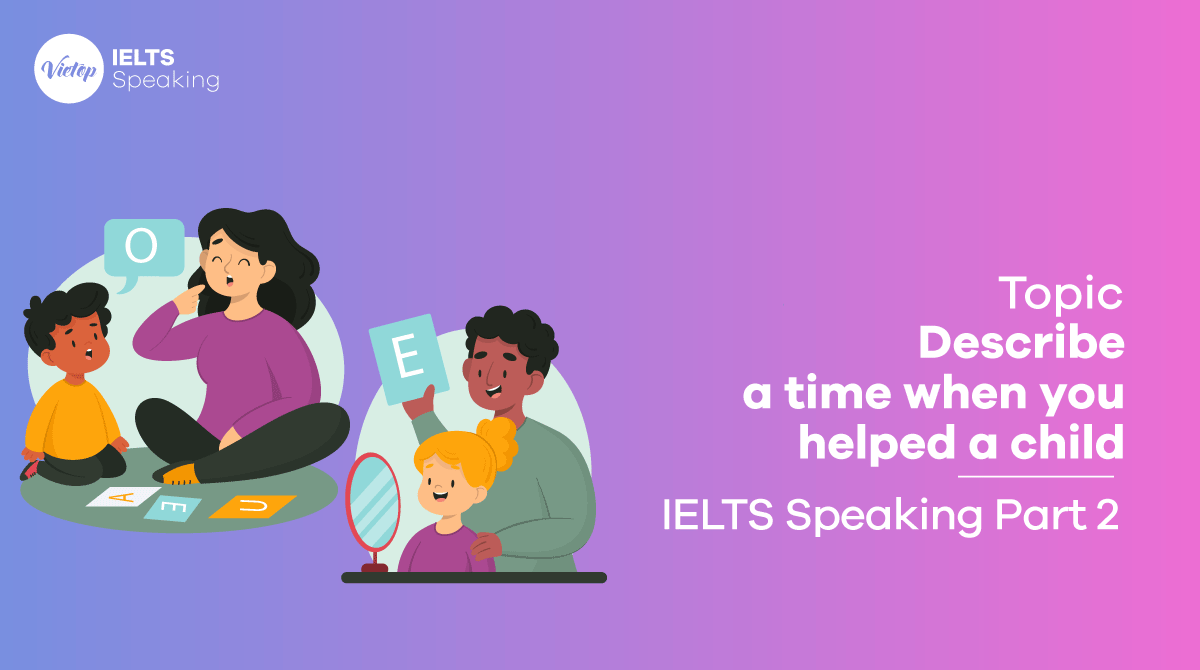
Sample
Well, as an altruist, I am very keen on helping others around, especially kids who are considered to need support the most. Today, I am going to tell you about the time that I bent over backwards to help a six-year-old boy to find his way back home while being lost in the park
Back in the day when I was taking a stroll in the park on Dien Bien Phu street, I bumped into a kid weeping under a tree canopy. I approached him to sooth him and later asked him about his trouble. He told me that while hanging out with his classmates on the pavement, he saw an eye-catching T-shirt in a boutique and stopped by to have a look at it. Once he turned around, his friends were out of sight.
After taking a bit of walk, he saw the park and entered it because he was afraid of getting kidnapped. I tried to ask him about his home address and parents’ numbers but my efforts went in vain as he couldn’t remember them in full details. Fortunately, he was still able to vividly remember his school’s name and with just little information given, I decided to book a car without a second thought. As soon as we arrived the school, I immediately asked about his profile and one of the officers assisted us in reaching his parents. Really soon after, they came to school and took his son back home.
Honestly, seeing the kid feeling jubilant when he reunited with his parents really made my day. I hope that his parents will take this unpleasant experience as a lesson so there would be no remorse.
- Altruist (n): người theo chủ nghĩa vị tha
- Take a stroll (v): đi dạo
- Bump into (v): tình cờ gặp
- Weep (v): khóc sướt mướt
- Sooth (v): xoa dịu
- To be out of sight (phrase): đi khuất
- Go in vain (phrase): trở nên vô nghĩa
- Without a second thought (phrase): không cần suy nghĩ
- Jubilant (adj): mừng rỡ
- Make someone’s day (idiom): khiến ai đó cảm thấy vui
- Remorse (n): sự hối tiếc.
Hãy kể cậu chuyện của bản thân khi giúp một đứa trẻ và triển khai từng chi tiết trong câu chuyện của các bạn. Trong câu trả lời này, câu chuyện kể về một đứa trẻ đi chơi với bạn và vô tình bị lạc. Hãy kể chi tiết bạn giú cô / cậu bé như thể nào và sau đó thể hiện cảm xúc của bản thân với sự việc trên.
Audio
IELTS Speaking Part 3
1. In what ways do people usually help each other?
To me, people can help each other in various ways. Whether we are their family members or neighbors, being there for them means a lot as one of the most valuable gifts people can give each other is their time. Therefore, some people tend to make the unfortunate ones feel that someone’s got their back. Additionally, financially supporting people who are in need is a typical way to help them sail through difficulties in life.
- Unfortunate (adj): không may mắn
- Get someone’s back (phrase): luôn hỗ trợ ai đó
- Financially support (v): hỗ trợ về mặt tài chính
- Sail through difficulties in life (v): vượt qua khó khăn trong cuộc sống
🡪 Giúp đỡ về mặt tình thần và tài chính được xem là những cách phổ biến được mọi người áp dụng. Để thuyết phục hơn, chúng ta có thể đề cập những kết quả tích cực mà chúng mang lại.
2. Should schools be responsible for teaching students how to cooperate?
Yes, indeed. Cooperation should be encouraged among students at school. Learning how to collaborate with peers can allow them to promote their sense of community and collectivity, which would turn them into well-adjusted individuals in the future.
- Sense of community and collectivity (n): tính cộng đồng và tập thể
- Well-adjusted individual (n): người tốt
🡪 Trường học luôn là nơi dạy dỗ và rèn dũa tính cách c
3. What are the differences between help from friends and help from family?
Receiving aid from friends and that from family members bear no significant differences. Some find that their friends are more trustworthy and know them inside out, so they tend to turn to friends when they are in trouble. However, as a saying goes “ Blood is thicker than water” , so family has become an integral part of some individuals’ lives. Therefore, they will feel more relieved when asking their relatives for help.
- Aid (n): sự giúp đỡ
- Bear no significant differences (v): không có quá nhiều sự khác biệt
- Trustworthy (adj): đáng tin
- Know someone’s inside out (idiom): rất hiểu ai đó
- Blood is thicker than water (proverb): một giọt máu đào hơn ao nước lã
- Integral part (n): phần không thể thiếu
🡪 Mọi sự giúp đỡ, dù là từ người thân hay bạn bè, rõ ràng không mang quá nhiều khác biệt. Chỉ cần chúng ta tin tưởng ai thì sự giúp đỡ đều thật sự đáng trân trọng.
Audio
Đề IELTS Speaking Tháng 09/2022
Ngày 03/09/2022
IELTS Speaking Part 1: Dancing
1. Do you like dancing? (Why/ Why not?)
I don’t see why not even though I am not much of a dancer. Honestly, dancing can lift up my spirit and flush my worries away, so whenever I am in bad mood, I would dance to let loose.
- Lift up someone’s spirit (phrase): vực dậy tinh thần cho ai đó
- Flush someone’s worries away (phrase): cuốn đi âu lo của ai đó
- Let loose (v): thư giãn
→ Rõ ràng nhảy đem lại cho chúng ta những lợi ích nhất định phải không nào. Việc đưa ra những thông tin này sẽ giúp câu trả lời của chúng ta thêm phần thú vị đấy.
2. Did you take dance lessons?
Well, when I was in high school, I used to learn some dance moves on Youtube. You know, there are a bunch of tutorial videos which can teach you how to dance from scratch on such a platform.
- Tutorial video (n): video hướng dẫn
- From scratch (idiom): từ đầu
→ Với sự xuất hiện của các nền tảng xã hội, chúng ta hoàn toàn có thể tiếp cận với việc học nhảy một cách dễ dàng. Youtube là một ví dụ hoàn hảo cho câu trả lời của chúng ta đối với câu hỏi này đấy.
3. In the future, would you like to learn dancing?
If I had time to kill, I think I would sign up for modern dance classes as this type of dance really hooks me. However, I have been up to my ears in work recently, which leaves me no time for dancing.
- Have time to kill (idiom): có thời gian rảnh
- Hook (v): thu hút
- Up to someone’s ears in something (idiom): bận bịu với cái gì đó
→ Một trong những cách phát triển câu hỏi dài mà vẫn tự nhiên đó chính là hãy đề cập đến việc bạn bận như thế nào.
4. When was the last time you danced?
It has been approximately 5 years since the last time I danced if my memory serves me well. I was invited to one of my friends’ birthday party held in a nightclub. At first, I didn’t intend to dance but the DJ really got me going.
- If my memories me well (idiom): nếu tôi nhớ không lầm
→ Hãy nghĩ về một thời điểm trong quá khứ và phát triển ý đúng với những gì đã diễn ra tại thời điểm đó nhé!
Audio
IELTS Speaking Part 2
Describe an important text message you received
You should say:
- Who sent the message
- What was in the message
- Why the person sent the message
And explain why the message was important to you.
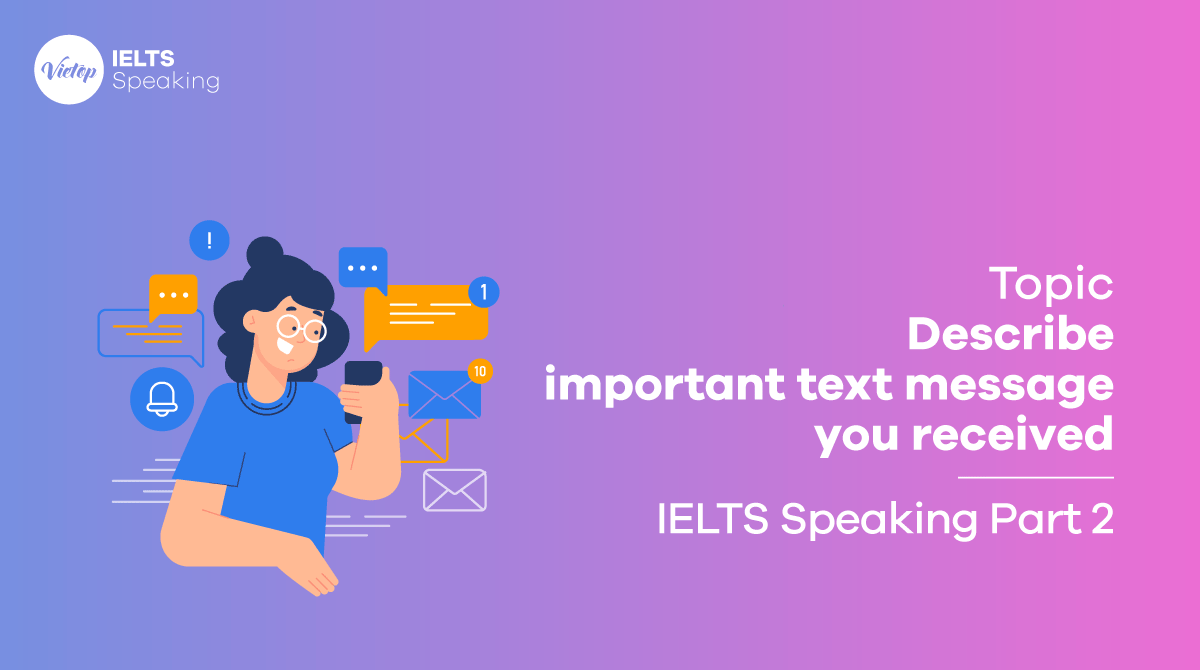
Sample
As a matter of fact, our phones have received tons of messages on a daily basis, most of which are usually not important. But, there was one message that really changed my life and I am going to talk about it now.
I received this text message about 1 year ago when I was between jobs. You know, being unemployed was a painful letdown for me since I consider myself a high self-esteem person.
It was Sunday afternoon and I was immersing myself in listening to some of my favorite songs. Lo and behold, a message from one of my bosom friends popped up on my phone, asking me to apply for her company. More importantly, the vacant position offered to me really suited my qualifications, which means that I would have higher chances to be employed
To be honest, my heart skipped a beat and I felt over the moon when receiving such an offer since I had been staying at home for donkey’s years without getting paid. I screamed out loud and showed it to my parents. I cannot find the words to express how elated I was at that time. Before the text message was sent to my phone, I hadn’t stayed positive because I had felt that that time had been the nadir of my career and my living expenses could have been a heavy financial burden for my parents.
However, after all those tough years, I could get back to work and have my own financial freedom. Among the messages I have got, I consider this message my own lucky charm, so I still keep it on my phone. Additionally, reading this message can remind me of how strong I was to overcome negative feelings and difficulties in life, thereby giving me a boost to keep moving forward.
- Between jobs (idioms): thất nghiệp
- Letdown (n): nỗi thất vọng
- High self-esteem person (n): người có tự trọng cao
- My heart skips a beat (idiom): tôi cảm thấy rất phấn khích
- Flush someone’s worries away (phrase): cuốn đi âu lo của ai đó
- Over the moon (idiom): sướng rân
- Donkey’s years (phrase): rất lâu
- Elated (adj): hạnh phúc
- Lucky charm (n): bùa may mắn
- Give someone a boost (v): thúc đẩy tinh thần
→ Để triển khai ý ở Topic này, đòi hỏi chúng ta phải brainstorm về một tin nhắn mang tính quan trọng. Việc đề cập đến việc có được việc làm thông qua tin nhắn là một ví dụ điển hình cho tính chất quan trọng đó. Đồng thời, việc diễn tả cảm giác của bạn như thế nào khi nhận được tin nhắn như thế là một cách hay để phát triển ý đấy.
Audio
IELTS Speaking Part 3: Sending messages
1. Why do people prefer texting as compared to phone calls?
Well, there is a fact that most people use phones not for their primary purpose which is making calls but for texting and this can be explained by a number of reasons. For starters, a text message is less demanding than a phone call as people can choose to reply at their convenience, which make them less likely to be under pressure.
Another good reason is that text-based communication is much more private. In fact, we tend to speak in a mumble to avoid being overheard by others. However, sending messages allows us to feel more secure and comfortable to communicate.
- For starters (phrase): đầu tiên
- Text-based communication (n): phương thức giao tiếp bằng tin nhắn
- Speak in a mumble (v): nói khẽ
→ Hãy so sánh những lợi ích của việc gửi tin nhắn so với việc gọi điện để làm tăng tính thuyết phục cho câu hỏi này nhé.
2. Have the ways that people communicated with each other changed much in the last few decades?
With the advent of technology, we have witnessed some significant changes in how people communicate. Decades ago, verbal communication was deemed the primary means of communication as it was time-consuming and less effective to put our speech into written form.
At present, distance communication has been facilitated since social media platforms have enabled users to communicate both in written and spoken forms. For example, Facebook – one of the most popular social sites offer users a wide range of features such as video calling, texting and sharing stories which enable them to interact with each other more effectively.
- Verbal communication (n): giao tiếp bằng lời nói
- Distance communication (v): việc giao tiếp từ xa
- Facilitate (v): làm cái gì đó dễ dàng hơn
→ Ở câu hỏi này, việc so sánh giữa hiện tại và quá khứ khi nói về khía cạnh giao tiếp sẽ là một cách hiệu quả để khiến câu trả lời mang tính thuyết phục cao.
3. What do you think are some of the main differences between written communication and spoken communication?
In my opinion, there are some notable distinctions between spoken and written forms of communication. Oral communication involves gathering or disseminating information through spoken words. However, there is a need for people to deliberately select words and phrases when it comes to written communication as it requires more formality compared to the other.
Additionally, body language and facial expression are powerful approaches to make spoken speech conveyed more effectively while written texts are more comprehensible when sentences are arranged in a proper order.
- Notable distinction (n): sự khác biệt đáng chú ý
- Disseminate (v): phân tán
- Deliberately (adv): một cách kĩ lưỡng
- Comprehensible (adj): dễ hiểu
→ Trọng tâm của câu hỏi đó chính là so sánh sự khác nhau giữa việc giao tiếp bằng ngôn ngữ nói so với ngôn ngữ viết. Trên cơ sở đó, hãy đến những yếu tố then chốt của mỗi phương thức giao tiếp để lập luận cho những sự khác nhau đấy nhé.
Audio
Ngày 05/09/2022
IELTS Speaking Part 1: Rubbish/ Garbage
1. What do you do when you see rubbish on the street?
I pick it up and put it in the rubbish bin. I feel annoyed when I see litter on the street. I try my best to keep the streets clean and I hate it when people throw rubbish everywhere.
Litter (n): rác trên đường phố
2. How do you recycle things like paper and plastic?
I reuse paper and plastic bags as much as possible. I keep them with me when I go shopping and ask the cashiers to put my groceries in those bags.
Grocery (n): hàng hóa mua tại tiệm tạp hóa
3. Do you think your city is clean or not?
Unfortunately, it’s not clean. There is a lot of rubbish because of people who litter. Beside that, the air is polluted from vehicle fumes. I hope it will change soon.
Fume (n): khói
4. Have you ever done anything to help the environment?
I helped my parents to set up a recycle rubbish bin for plastic in our home. I wish I could have done more!
Audio
IELTS Speaking Part 2
Describe a person who encouraged you to achieve a goal.
You should say:
- Who this person is
- What this person encouraged you to do
- How this person helped
And explain why this encouragement helped you to achieve the goal.
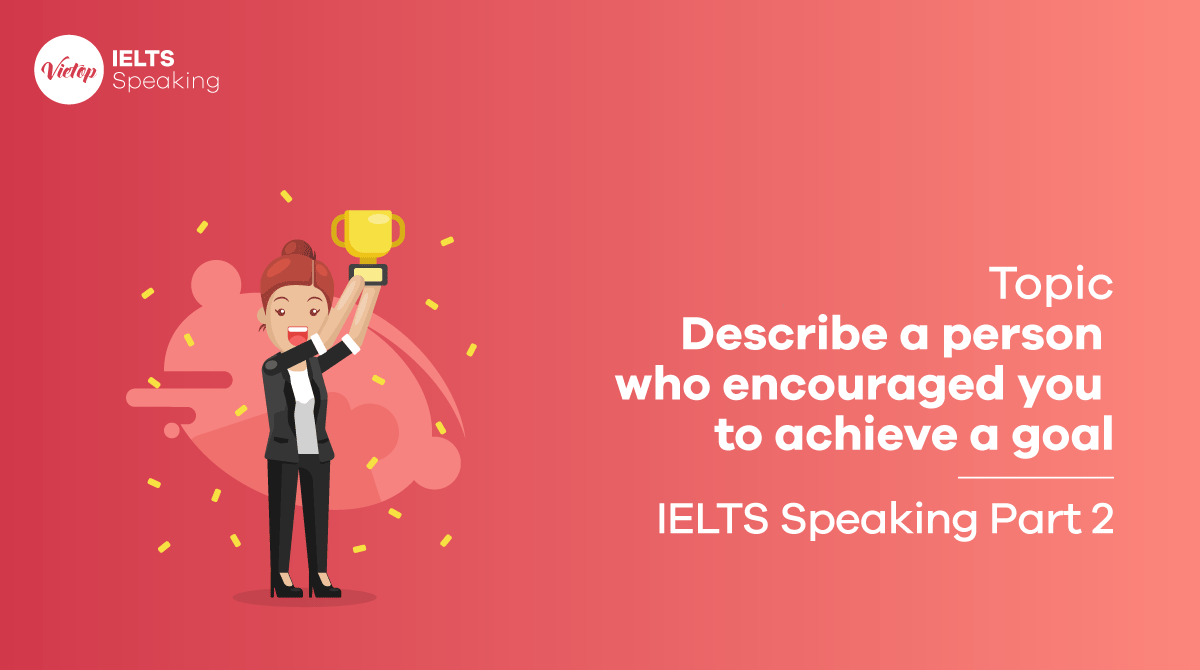
Sample
I’m going to talk about my mum, the person who’s supported me the most in life.
She is of average height and she has a slender figure. She’s in her 50s so she has some grey hair and wrinkles around her eyes. But that doesn’t matter, because to me, she’s the most beautiful woman in the world. Her face is round but thin, and she often smiles.
In terms of her personality, she is a caring person and a sensitive mother. She’s never put pressure on her children. On the contrary, she always encourages my brother and I to pursue our passions. For me, it was architecture and had it not been for her, I would never have fulfilled my dream, being a student of the University of Architecture.
At that time, I needed to pass the national exams for university entrance for three subjects: painting, Maths and Physics. I was fairly confident about the latter two, but my painting skill was not sufficient. I was anxious and heartbroken because my practice paintings were criticised harshly when I posted them online. Seeing that I was worried, my mum told me to take a gap year to hone my drawing skill.
She even signed me up for a painting course even though my family was not well-to-do. During that year, she kept pushing me to meet the course deadlines. She even stayed up at night when I was doing my homework. Eventually, I got good enough to pass the test and was admitted to the university. I’m very thankful for my mum.
- Wrinkle (n): nếp nhăn
- On the contrary: ngược lại
- To pursue: theo đuổi
- Anxious (adj): lo âu
- To hone (v): trau dồi
- Well-to-do (adj): giàu có
→ Câu hỏi yêu cầu tả một người đã từng khuyến khích bạn đạt được một mục tiêu. Tuy là dạng tả người, tuy nhiên bạn phải lưu ý phải làm nổi bật được chi tiết về việc người này khuyến khích bạn đạt được mục tiêu. Có thể kết hợp tả một câu chuyện ngắn để làm rõ chi tiết này. Ngoài ra cũng nên tả một ít về ngoại hình và tính cách. Khi miêu tả tính cách nên tả để cho thấy người này quan tâm đến bạn.
Trình tự gợi ý: giới thiệu → tả ngoại hình/tính cách → kể câu chuyện liên quan đến câu hỏi → cảm nghĩ.
Audio
IELTS Speaking Part 3: Encouragement
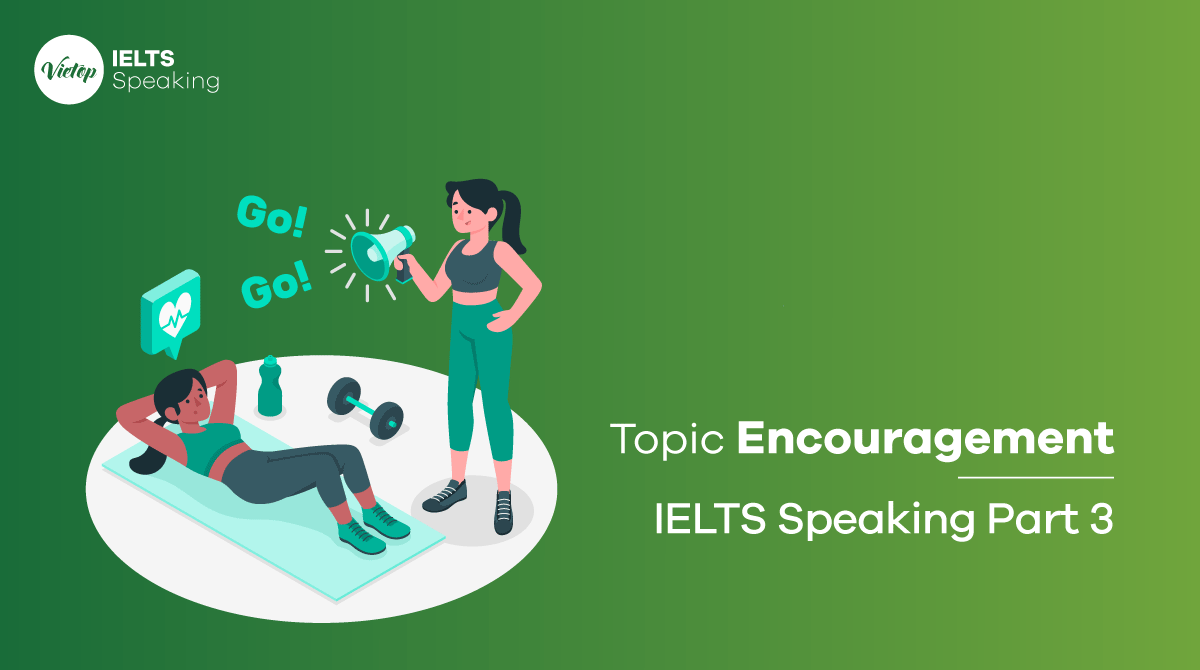
1. Is it important for people to have clear goals?
It’s definitely crucial to have doable targets. Without goals, we may not know what to do with our life. I know that if I don’t set my daily target, I will just spend that day procrastinating. Furthermore, we need to be realistic when setting goals. If the goal we set is too ambitious, we may fail many times. That is demoralising and defeats the purpose of having targets.
- Crucial (adj): quan trọng
- To procrastinate (v): trì hoãn
- Demoralising (adj): làm nản lòng
- To defeat the purpose (v): làm mất tác dụng
→ Câu hỏi yêu cầu thí sinh đánh giá (yes/no) tầm quan trọng của việc có những mục tiêu rõ ràng. Người trả lời nên bắt đầu bằng việc nêu quan điểm cá nhân có hay không rồi khai triển câu trả lời bằng cách cách nêu lí do, dẫn chứng hoặc liên hệ cá nhân.
2. What do you think would encourage young children to learn more?
Responsibilities! I think if you teach children to be responsible for something, they will also want to learn more to do their responsibility better. For instance, instead of teaching a child how to sweep the floor, their parents can tell them that it’s their responsibility to keep their room clean and reward them. They may want to learn to sweep the floor on their own as it’s how they keep their room clean.
- To sweep the floor: quét nhà/sàn
- To reward (v): thưởng
→ Câu hỏi yêu cầu thí sinh nêu những thứ có thể dùng để khuyến khích trẻ em học thêm. Khi trả lời, thí sinh có thể nêu một hay vài cách (vd: phần thưởng, trò chơi, …). Mỗi cách phải nêu lý do, dẫn chứng để làm rõ ý hơn.
3. How could we make children interested in things that they’re not?
I think their parents and teachers should be creative when teaching these children. They can play games and use real life examples to help capture their attention. When they are not interested in something, it is likely because they find it hard to understand it. So, parents and teachers should teach them slowly to keep them engaged in the topic. Give them simple questions so they can answer along the way.
To capture someone’s attention: thu hút sự chú ý của ai đó
→ Câu trả lời nên đánh vào đặc điểm của trẻ em, đó là sự đơn giản và tính giải trí cao. Mọi thứ nên được diễn giải một cách đơn giản và dễ hiểu, để trẻ em có thể dễ dàng nắm bắt. Có thể cho thêm ví dụ cụ thể để giải thích rõ ý tưởng của mình.
Audio
Ngày 24/09/2022
IELTS Speaking Part 1: Puzzles
1. Did you do puzzles when you were a kid?
Well in fact, I was a huge fan of puzzles when I was younger. Precisely, I am pretty mad about solving rubik’s cubes. You know, I had a collection of different geometrical shapes and colors. It was a marvelous way to challenge your brain and kill your time.
In addition, I was also into logic puzzle questions, such as investigating crime scenes or word riddles. It helped sharpen my reasoning and memory recollection of experience.
- Be a huge fan of = be mad about s.th = be into s.th: miêu tả thích thay cho LIKE
- Geometrical shapes (noun phrase): hình dạng hình học
- Investigate (v): điều tra
- Crime scenes (noun phrase): hiện trường vụ án
- Word riddles (noun phrase): câu đố chữ
- Sharpen (v): mài giũa
- Reasoning (n): lý luận/ lập luận
→ Miêu tả các loại câu hỏi đố mình thích chơi lúc còn nhỏ. Học sinh có thể nêu rõ lý do tại sao mình thích hoặc lợi ích của việc giải những câu hỏi đố đó.
2. When do you do puzzles, during a trip or when you feel bored?
Well to be honest, it kind of depends really. To be more exact, if I am on my way, traveling to tourist destinations during holidays, then it will be a brilliant choice to carry a rubik’s cube to pass the time. In addition, whenever I feel a bit torpid, I will grab my phone and play some puzzle games.
- Pass the time = kill time (verb phrase): giết thời gian
- Torpid (a): chán chường
→ Bài giải sử dụng mô tuýp nêu cả hai trường hợp đều chơi giải đố khi đi chơi và khi buồn chán. Thí sinh có thể chọn một trong hai trường hợp để nói nhưng vẫn nên đề cập trường hợp còn lại. Ví dụ, thí sinh có chơi giải đố khi buồn chán (lý do); tuy nhiên có nói rõ khi đi du lịch không chơi (lý do).
3. What do you like doing, word puzzles or number puzzles? Which one is more difficult for you?
In all fairness, I guess it’s fairly intriguing and challenging especially when it comes to number puzzles. I am pretty fond of finding missing numbers based on the prompted patterns. These brain teasers encourage problem-solving and logical thinking.
Moreover, word puzzles are also excellent for language learning. You know, these give you a chance to acquaint yourself with new vocabulary or review learnt ones.
- Intriguing (a): hấp dẫn
- Prompted patterns(noun phrase): các gợi ý về mối liên quan giữa các con số
- Brain teasers (noun phrase): vấn đề phức tạp kích thích não hoạt động
- Acquaint yourself with (verb phrase): học/làm quen với
Bài giải sử dụng mô tuýp đề cập những lý do yêu thích với từng loại câu hỏi đố và trả lời number puzzles khó trong khi word puzzles thì không.
4. Do you think it is good for old people to do puzzles?
Generally, there are two major benefits when inducing the elderly to pick up solving puzzles as a hobby.
Firstly, they are a nice approach to help with memory recollection or absent minds, which are common among the aged.
Secondly, those activities can keep them active. This plays a crucial role in combating mental stimulation, the feeling of loneliness, and depression which could result in dementia.
- Induce (v): khuyên/ khuyến khích
- Absent minds (noun phrase): người hay quên
- Mental stimulation (noun phrase): kích thích trí tuệ
- Dementia (n): bệnh sa sút trí tuệ
Bài giải cũng sử dụng mô tuýp liệt kê hai lợi ích chính:
- Giúp ghi nhớ
- Giúp họ bận rộn và tỉnh táo, phòng tránh các bệnh lý về tâm lý
Audio
IELTS Speaking Part 2
Describe a time when you saw a lot of plastic waste (E.g in a park, on the beach etc.)
You should say:
- Where are when you saw the plastic waste
- Why there were a lot of plastic waste
- What you did when you saw them
And explain what you think about this.
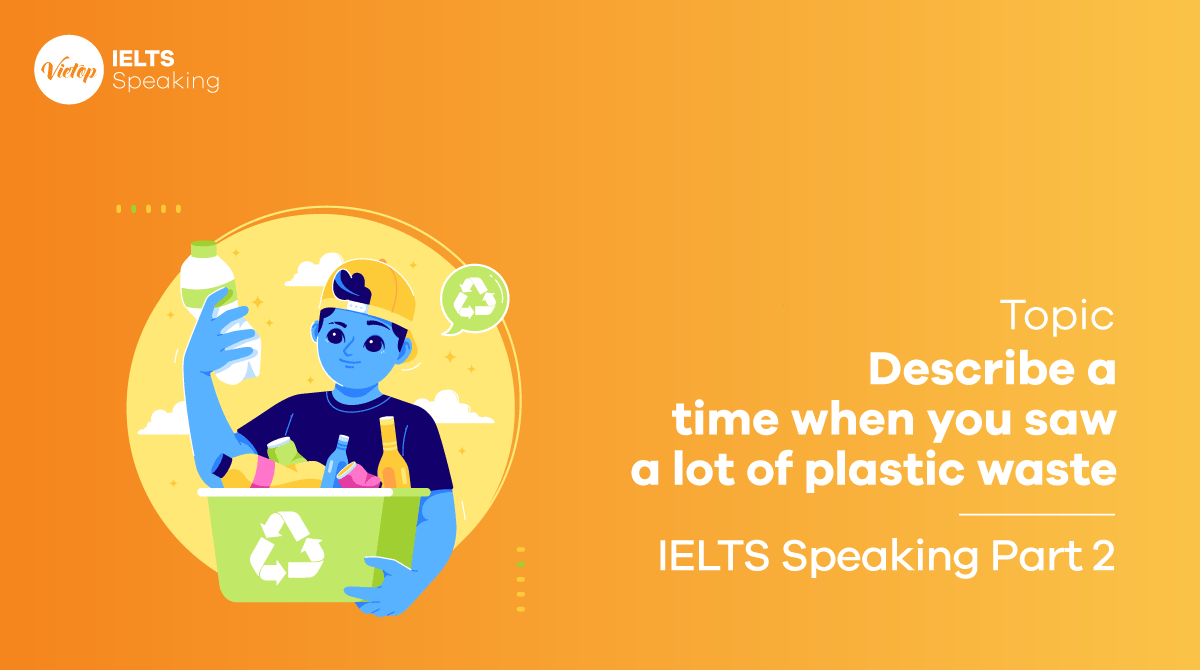
Sample
If there were a competition for the most distressing moment I’ve ever had, the time when I visited Koh Rong Sanloem would be a strong contender.
If memory serves me correctly, it was in my junior year when my best friend and I decided to travel to that island in Southern Cambodia. Precisely, it is a reputable destination where thousands of tourists flock to every year.
In terms of its attractions, the island was once a fishing village which is currently marketed with untouched natural features. Its simplicity and originality completely stand out. Hence, the authenticity of Cambodian cuisine is well-complemented by the area’s diversity of seafood. What is more, countless aquatic and hiking activities are also its strong hold.
However, it was such a pity that the scenery here was incredibly spoiled with trash, especially plastic bags and bottles. The corporates could perhaps be the villagers and tourists whose negligence and irresponsibility were at the expense of not only the island’s aesthetic but also the marine life. We did try to pick up and categorize the litter on our way, but it was like a drop in the ocean. I wished the local government and environmental enthusiasts would do something about this.
To cut the long story short, it is definitely an unforgettable experience showing how much we have wronged Nature.
- Reputable (a): có uy tín
- Flock to (verb phrase): đổ về
- Cuisine (n): ẩm thực
- Complemented (a): tôn lên
- Corporates (n): các thủ phạm
- Negligence and irresponsibility (n): sự cẩu thả và thiếu trách nhiệm
- A drop in the ocean: quá nhỏ không đủ sức ảnh hưởng
- Aesthetic (n): thẩm mỹ
- Wrong (v): làm sai/ đối xử tệ
Bài giải miêu tả các nội dung về THỜI ĐIỂM, VỚI AI, ĐIỂM ĐIỂM ĐẶC BIỆT, và vấn đề về Ô NHIỄM. Về phần ô nhiễm thí sinh có thể nêu lý do của việc ô nhiễm và hành động mình đã làm như câu hỏi gợi ý.
Audio
IELTS Speaking Part 3: Plastic products
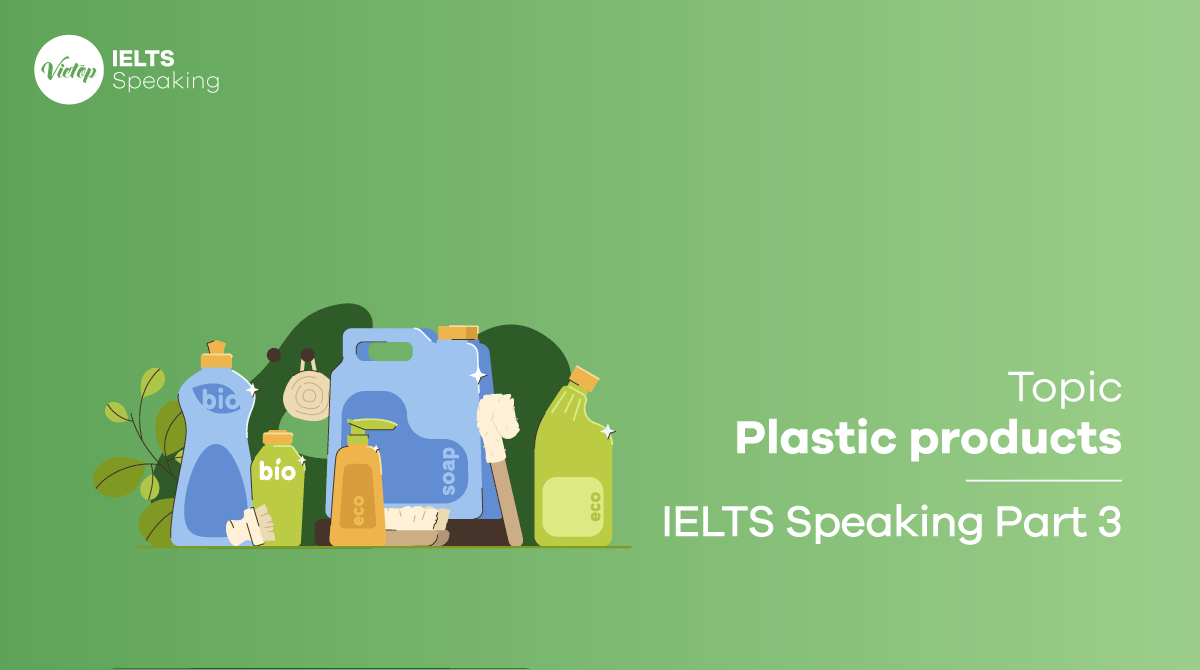
1. What are the benefits of using plastic products?
Well, I guess there are a few merits when we make the most of plastic.
First of all, its lightweight and durability are ideal criteria for containers and other products. You know, it is unlikely to rust and spoil the content.
Additionally, plastic is recyclable at a lower cost, compared to metal and glass.
Lastly, this material helps promote consumerism when merchandise is economically manufactured and thus affordable for customers.
- Lightweight and durability (n): nhẹ và bền
- Rust (v): rỉ sét
- Consumerism (n): chủ nghĩa tiêu dùng, mua nhiều đồ và có những hậu quả lên môi trường hoặc hành vi tiêu dùng…
→ Bài giải liệt kê hai lợi ích của đồ nhựa.
- Nhẹ và bền, không dễ hư
- Giá rẻ/ dễ tái chế
Thí sinh có thể liệt kê những ý khác nhưng lưu ý discourse markers chuyển giữa các ý.
2. How can people reduce their use of plastic?
Honestly, there are several ways for people to cut down on the daily amount of plastic.
To begin with, they could replace plastic containers with other ones. For example, they can bring their own bottles for beverages and tote bags when shopping.
Secondly, they can reuse their plastic products for other purposes, such as growing plants or making crafts.
- Cut down on (verb phrase): cắt giảm
- Beverages (n): đồ uống
- Tote bags (n): túi vải xách đồ
→ Bài giải liệt kê 2 cách thức giảm lượng rác nhựa. Thí sinh có thể chọn liệt kê thêm, đi kèm với việc giải thích lý do/ lợi ích/ dùng ví dụ để phát triển ý.
3. What kind of plastic waste is often seen in Vietnam?
Well based on my experience, there are some common types of plastic waste in my country. But I assume that the most ubiquitous would be containers for beverages and food or bags. This is because they are consumed and thrown away on a daily basis.
As well as those mentioned products, another kind worth mentioning would be household appliances. Nowadays, industrial technology facilitates better manufacturing processes so that those appliances can be sold at a price to suit everyone’s pocket. As a result, the products’ lifespan is much shorter, and they end up in landfills.
- Ubiquitous (a): phổ cập/ có mặt khắp nơi
- Lifespan (n): tuổi thọ/ vòng đời của sản phẩm
- Landfills (n): bãi rác
→ Câu hỏi yêu cầu nêu các loại rác thải nhựa thường gặp.
- các hộp, chai, ly và túi gọi chung là đồ đựng/ đồ chứa
- sản phẩm vật dụng trong gia đình (có thể liệt kê ra)
Ngoài ra thí sinh có thể chọn liệt kê những loại khác nhưng nên nêu lý do tại sao người ta lại thải ra nhiều hơn những loại khác.
4. What are the problems when there is too much plastic waste?
As a matter of fact, there are two evident consequences when the amount of plastic pollution is too much to handle. First of all, it renders the natural world vulnerable since it has fatal effects on animals both on land and in the ocean. Many marine creatures were choked on plastic bags, which has received heavy coverage on the news in recent years.
Secondly, the environment we live in will be impacted as well. The health problems related to hazardous release from waste incineration and micro-plastic contamination have gained much contention.
- Consequences (n): hậu quả
- Fatal (a): gây tử vong
- Choked (a): bị nghẹn/mắc cổ
- Received heavy coverage on the news (phrase): được nhiều trang báo đưa tin
- Hazardous (a): nguy hiểm
- Release (v, n): phóng thích/ (chất) thải ra
- Waste incineration (noun phrase): đốt chất thải
- Micro-plastic (n): vi nhựa
- Contamination (n): sự ô nhiễm
- Contention (n): sự tranh cãi
→ Bài liệt kê những hậu quả có thể xảy ra:
- Gây nguy hiểm với động vật
- Ảnh hưởng đến môi trường sống của loài người.
Audio
Ngày 26/09/2022
IELTS Speaking Part 1: Chocolate
1. What’s your favorite chocolate flavor?
Well in fact, I have been a huge fan of chocolate since I was a kid. Precisely, I am pretty mad about dark chocolate. You know, it has a lower proportion of sugar and milk, so you can indulge in the cocoa’s bitterness and aroma without worrying about gaining weight.
In addition, I am also into the matcha flavor. The Japanese powdered green tea makes an incredible combination with chocolate. It’s a marvelous choice when trying something new.
- Proportion (n): tỉ lệ
- Bitterness and aroma (nouns): vị đắng và hương vị
- Gaining weight (verb phrase): tăng cân
- Makes an incredible combination (phrase): tạo nên một sự kết hợp đáng kinh ngạc/ tuyệt vời
→ Liệt kê một hai loại chocolate mà mình thích. Thí sinh có thể chọn chocolate kết hợp với các loại hạt hoặc vị khác mà mình thích và miêu tả sự đặc biệt của nó. Lưu ý nên sử dụng các cụm từ thay thế cho “like”.
2. Is chocolate popular in your country?
Well to be honest, it kind of depends really. To be more exact, young people display a marked preference for this kind of confectionery. I guess it has something to do with the fact that chocolate has established itself in the rituals of the modern world along with the power of advertising. It’s quite common if you give your friend or someone you love some bars of chocolate as a gift, right?
On the other hand, it’s not well-liked by the aged. Taking my grandmother as an example, she prefers traditional treats like candied coconut ribbons to chocolate.
- Display a marked preference (verb phrase): thể hiện sự yêu thích
- Confectionery (noun): bánh kẹo
- Established itself in the rituals of the modern world (verb phrase): củng cố vị thế của nó trong nghi thức xã hội hiện đại (ý ám chỉ các dịp lễ người ta sẽ tặng nhau chocolate như một hình thức truyền thống – Valentine’s Day)
- The aged (noun phrase): người già (số nhiều)
- Treats (n): món ăn vặt, thường là đồ ngọt
- Candied coconut ribbons (noun phrase): mứt dừa
→ Bài giải sử dụng mô tuýp phân tích sự khác biệt về sở thích và mức độ phổ biến của chocolate theo độ tuổi của người già và người trẻ. Lưu ý các cụm từ miêu tả đồ ngọt để tránh bị lặp.
3. Do you think people use chocolate differently now than in the past?
In all fairness, I guess it’s fairly intriguing and innovative especially when it comes to how chefs devise new ways to incorporate chocolate with other ingredients or their culture. For example, I was really surprised when finding out that chicken salad with chocolate and vinegar dressing is quite popular among Parisians.
At the same time, old-fashioned chocolate chips and bars still retain much of their sensation.
- Intriguing (a): hấp dẫn
- Devise (v): tạo/ sáng tạo ra cái mới
- Incorporate (v): kết hợp
- Dressing (n): nước sốt dầu giấm cho salad
- Parisians (n): người sống ở thủ đô Paris
- Old-fashioned (a): truyền thống
- Retain (v): giữ lại
- Sensation (n): sự chú ý/ quan tâm/ sở thích
→ Bài giải sử dụng mô tuýp đề cập có một số thay đổi về cách người ta thêm chocolate vào các món ăn hoặc kết hợp với các món truyền thống. Đồng thời, nêu rõ những loại chocolate truyền thống vẫn còn được sản xuất ngày nay.
4. Is chocolate good for our health?
Generally, chocolate has been reputable for its abundance in healthy nutrients and antioxidants. It’s also proven to promote cardiovascular health. This is definitely the case for dark chocolate or pure cocoa powder.
But you also have to understand that most people tend to have a sweet tooth or binge on sweets, so they crave for artificially sweetened chocolate containing plenty of synthetic sugar substitutes which can bring on some health concerns, such as obesity or diabetes.
- Reputable for (a): nổi tiếng /có uy tín
- Abundance (n): dồi dào/ có nhiều
- Nutrients and antioxidants (nouns): chất dinh dưỡng và chất chống oxy hóa
- Artificially sweetened (phrase): làm ngọt nhân tạo
- Synthetic sugar substitutes (noun phrase): các loại đường tổng hợp
- Bring on (phrasal verb): gây ra (thường hay dùng với bệnh tật)
- Obesity or diabetes (nouns): béo phì hoặc tiểu đường
→ Bài giải sử dụng mô tuýp nhìn nhận vấn đề hai chiều: có lợi và cũng có hại cho sức khỏe. Mỗi cái nêu lý do/ nguyên nhân gây ra. Lưu ý các từ vựng liên quan đến sức khoẻ và thói quen ăn uống.
Audio
IELTS Speaking Part 2
Describe a friend you enjoy talking to.
You should say:
- Who is he/she
- How long you two are friends
- What you often talk about
And explain why you enjoy talking to him/her.
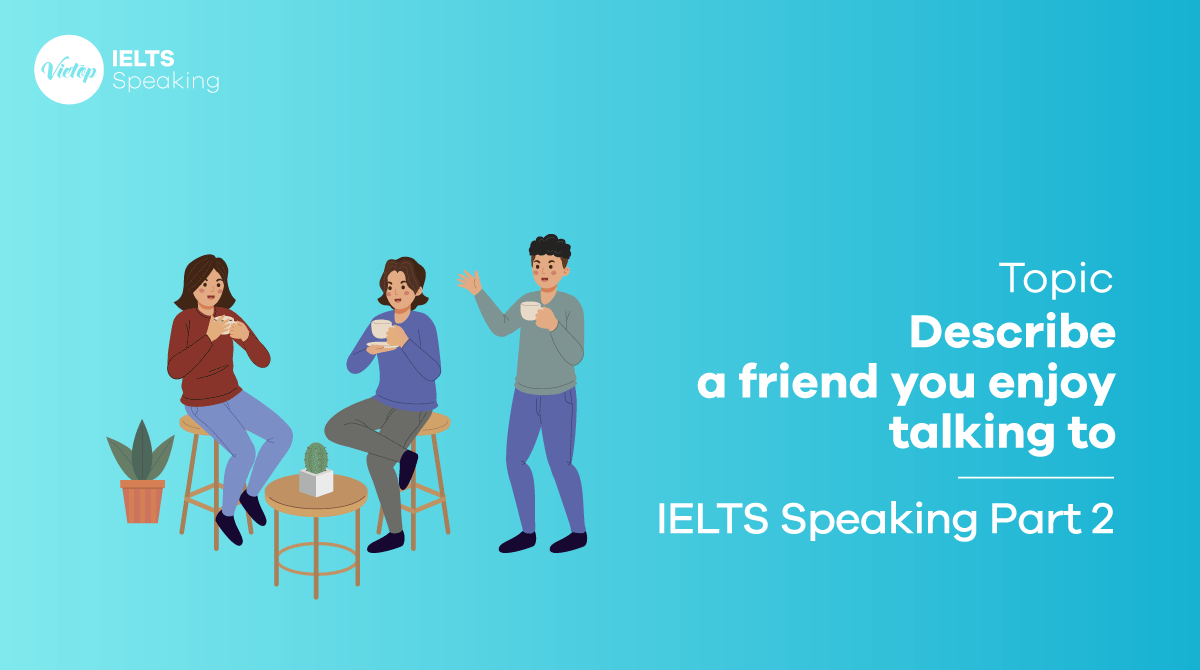
Sample
If there were a competition for the most humorous person that I know, Minh, my friend, would be a strong contender.
If memory serves me correctly, it was in grade 7 when we became desk mates and started to hang out. Precisely, we have been friends for more than a decade and support each other through ups and downs.
In terms of his appearance, he is pretty attractive among female peers for his incredible height and sharp look. Hence, he has an eye for fashion, so he even becomes a model for a few local brands in my city.
Regarding his personality, he is truly a social butterfly that gets along with everyone. Minh also has a really good sense of humour and is able to make other people see the funny side of serious situations. Lots of times he manages to break the tension by making people smile at what’s going on. Therefore, I love sharing and chatting with him about different things in our daily life and work, and vice versa. If I am in trouble, he will always give me a helping hand.
To cut the long story short, he is definitely a friend indeed.
- Ups and downs (idiom): thăng trầm
- Has an eye for s.th (idiom): có khiếu nhìn
- A social butterfly (idiom): người giao thiệp rộng rãi
- Gets along with (phrase): hòa hợp với
- Has a really good sense of humour (phrase): có khiếu hài hước
- Break the tension (phrase): phá vỡ sự căng thẳng
- Vice versa (phrase): ngược lại (bạn ấy cũng kể với tôi)
- A friend indeed (idiom): một người bạn chân chính, đồng cam cộng khổ
→ Bài giải miêu tả các nội dung về THỜI ĐIỂM kết bạn với người đó, NGOẠI HÌNH, TÍNH CÁCH, và những vấn đề thường chia sẻ với nhau. Thí sinh có thể chọn không đề cập về ngoại hình mà tập trung vào những sở thích hoặc những vấn đề trong cuộc sống/ học tập mà cả hai thường trò chuyện; mình cảm thấy như thế nào sau mỗi cuộc trò chuyện đó. Lưu ý những thành ngữ nói về bạn bè.
Audio
IELTS Speaking Part 3: Making friends
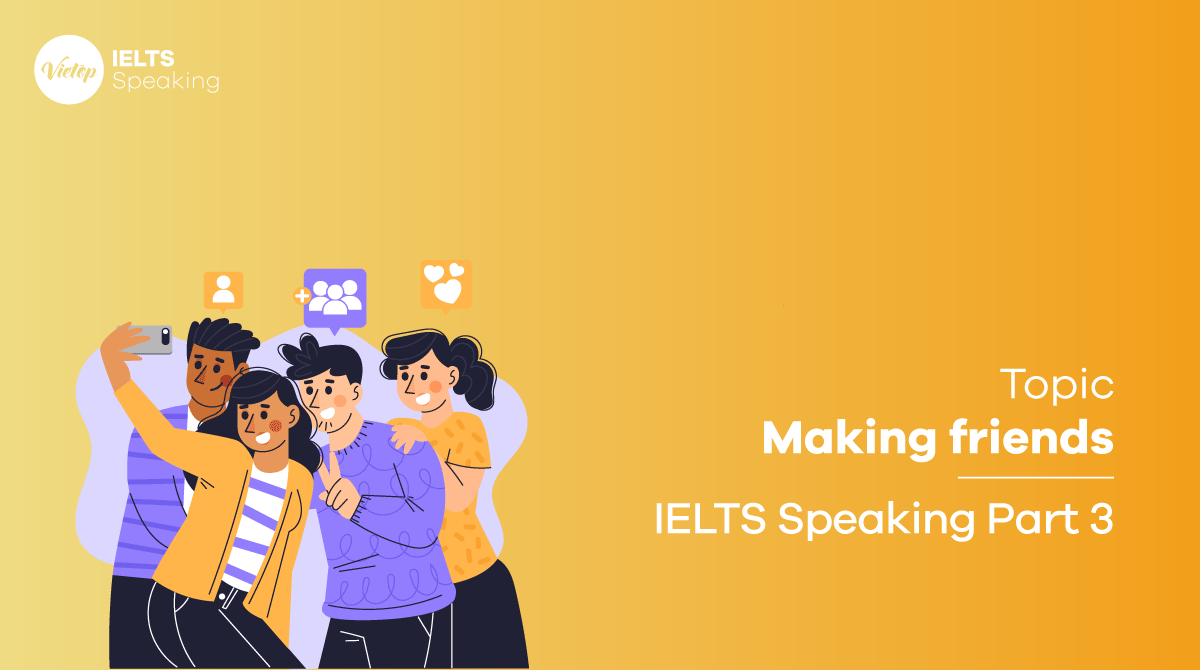
1. Do you think it is impossible to make real friends on the Internet?
Well, I guess an online friendship with strangers is too good to be true for two main reasons.
Firstly, people make new friends on social networks just for courtesy when someone with no real-life contact sends them a friend request after which they hardly keep in touch with each other, let alone meeting them in person.
The second reason worth mentioning would perhaps be due to our natures. Humans tend to be skeptical and only find it safe and comfortable when talking with those they know face to face.
- Too good to be true (phrase): quá tốt để trở thành sự thật/ không có thật/ không thể diễn ra
- Courtesy (n): phép lịch sự
- Let alone (phrase): đừng nói chi đến
- In person = face to face (phrase): mặt đối mặt/ trực tiếp
- Natures (n): bản chất
- Skeptical (a): hoài nghi
→ Bài giải liệt kê hai lý do khó có được tình bạn thật lòng trên mạng xã hội.
- Người ta kết bạn vì lịch sự chứ thật sự không muốn phát triển mối quan hệ bạn bè
- Vì mức độ tin tưởng
Học sinh có thể liệt kê những rủi ro khi kết bạn trên mạng xã hội.
2. Why is it hard to maintain friendships for some people?
Honestly, I guess my answer would be determined by different circumstances.
Particularly, if one is as busy as a bee, then it will be unlikely for that person to remain in touch with their friends. Most adults’ time is occupied with work and life matters, especially when they have a family with kids.
In addition, it could also be because of their introverted characteristics. These people usually find it tough to speak the same language with others and prefer being alone.
- As busy as a bee (idiom): bận tối mắt tối mũi
- Occupied with (a): bận rộn với
- Introverted (a): hướng nội
- Speak the same language (idiom): có cùng tiếng nói
→ Bài giải cũng liệt kê 2 lý do dựa trên trường hợp các cá nhân bận rộn và tính cách của cá nhân mà khó có thể giữ được tình bạn. Thí sinh có thể chọn miêu tả những tính cách tiêu cực.
3. What do you think it takes to become good friends?
Well based on my experience, there are some common factors that make people good friends.
But I assume that the most crucial one would be their willingness to be there for each other no matter what happens. This shows how much you care and treasure your friendship.
Another feature could be their honesty. Although you have to tell white lies in some certain situations, sincerity is a must for any long-lasting relationships because the truth will out.
- Willingness (n): sự tự nguyện
- Be there (phrase): sát cánh/ kề cạnh nhau
- Treasure (v): trân quý/xem trọng
- Honesty (n): sự trung thực
- White lies (noun phrase): lời nói dối vô hại
- Sincerity (n): sự chân thành/ thật lòng
- Long-lasting (a): lâu dài
- The truth will out (idiom): giấy không gói được lửa
→ Bài giải liệt kê hai tính cách QUAN TRỌNG NHẤT trong tình bạn. Thí sinh có thể chọn những tính cách khác. Lưu ý chọn lọc và tìm hiểu những cụm từ/ thành ngữ miêu tả tính cách.
Audio
Đề IELTS Speaking Tháng 10/2022
Ngày 08/10/2022
IELTS Speaking Part 1: Social network
1. What kinds of social networking websites do you like to use?
Like most of my friends, I use Facebook. I used to upload many photos on this site. However, I am now more careful with what I post online so I just use the messenger function to chat with my friends.
- Function (n): chức năng
2. Is it easy for you to make friends on social networking websites?
I would rather say that it’s easier to connect and talk to people on social media. Friends are people who I can trust, and I certainly don’t trust strangers online.
- Stranger (n): người lạ
3. Will you use these sites more in the future?
I hope I can cut back on the time I spend on these services as I want to spend more time with people in real life. I realised that even though I can talk to many online, nothing can beat real-life interaction.
- Interaction (n): tương tác
Audio
IELTS Speaking Part 2
Describe a trip that you took by public transportation.
You should say:
- When and where you went
- What kind of transport you used
- How your trip was
And explain why you chose to use public transportation for this trip.
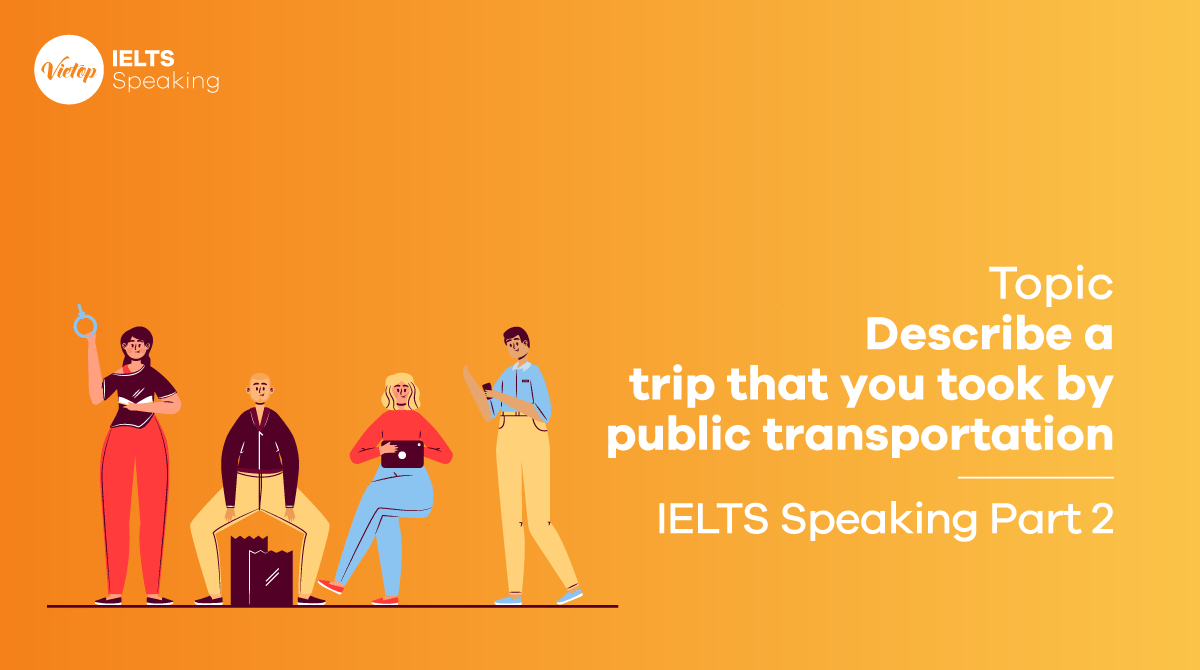
Sample
I’m going to talk about the time when I took the bus to work last month.
It was a Monday morning and my motorbike had broken down the night before. I could not get my vehicle fixed in time and therefore opted for riding a public bus.
I got up 30 minutes earlier than usual and walked to the bus stop near my house. When the number 107 bus was approaching the bus stop, I waved to let the driver know I wanted to get on. Once on board, I was instructed by the driver to put around 6.000 VND into a transparent plastic box and push a button on top from a ticket printer on top of it. And that’s how I bought my first bus tickets after many years. I used to ride the bus since I was a high school student but at that time there was a person selling tickets on the bus.
The trip was quite smooth because it was still very early in the morning, although I was quite worried because the driver drove a bit fast. On the bus with me were other people who were coming to work and students, who actually got reduced prices for their tickets. Through the window, I could see the sight of my city on the way to work for the first time. Usually, I had been too occupied dealing with the traffic.
Finally, I got to work on time without being stressed by the traffic. It was a nice ride and pleasant experience.
- To opt for something: chọn cái gì đó
- Transparent (adj): trong suốt
- Reduced price: giá giảm
- Occupied (adj): bận rộn, bận bịu
Audio
IELTS Speaking Part 3: Public transport
1. How easy is it to travel around your country?
Well I’d say it’s fairly easy to travel in Vietnam. The most popular mode of transport is obviously using a motorcycle. Even if you don’t own one, there are loads of ride hailing apps that allow you to book one when you travel somewhere else. For long distance travelling, people prefer coaches, trains or planes, whose tickets could be bought quite effortlessly through mobile apps and websites. However, when it comes to public transportation, I admit that there’s still a lot of room to improve.
- Ride hailing apps: các app xe công nghệ
- Coach (n): xe khách dạng bus
- Effortlessly (adv): một cách dễ dàng
2. Which method of travel do you consider safest? Why?
I firmly believe flight is their mode of travel and I’ll explain why. There are countless reports indicating that accidents involving aeroplanes are extremely rare. So, the proportion of passengers who get killed or injured by aeroplane-related accidents are lower compared to other types of vehicles.
While it is true that devastating flight accidents happen sometimes, only one out of millions of flights results in fatality. Therefore, while I understand why some people may have fear of flying since they feel that they can’t control the situation, I still think flying is the least risky way to travel.
- Countless (adj): vô số
- Devastating (adj): thảm khốc
- Fatality (n): sự tử vong
3. Has travel become safer in recent years than that was in the past?
This is quite a nuanced question that needs a nuanced answer. If only technology is concerned, I can say confidently that all types of travel are getting safer and better. However, we also need to think about the people who control the vehicles. I cannot tell for sure that people are becoming better at driving motorcycles or cars. That being said, I’m leaning toward travelling has become safer because in recent years there has been lots of effort put in driver education.
- Nuanced (adj): nhiều sắc thái, lớp nghĩa
- To lean toward: nghiêng về
4. How do you think people will travel in the future?
I’m a fan of technology and artificial intelligence and I really think self-driving vehicles will become a reality. If I’m not mistaken, many automobile companies have already been researching this technology. I think it’s a positive development as self-driving cars will be safer because computers tend to make fewer errors than humans.
- Artificial intelligence (n): trí thông minh nhân tạo
- To tend to: có xu hướng
Audio
Ngày 22/10/2022
IELTS Speaking Part 1: Books
1. Do you often read books? When?
I consider myself a bookworm. I read books indiscriminately. Fiction, nonfiction, adventure, fantasy, romance… you name it. I read books almost every day.
- Indiscriminately (adv): một cách không phân biệt
- You name it: vân vân
2. Are your reading habits now different than before?
Yes, when I was younger, I used to read strictly as a recreational activity. However, now that I am a college student, I spend around 2 hours every day reading textbooks and research articles to make sure I have a good grasp of my major.
- Recreational activity: hoạt động giải trí
- Grasp (n): sự hiểu bài/hiểu vấn đề
3. Have you ever read a novel that has been adapted into a film?
My friends and I have all read the Harry Potter book series. To me they’re as impressive as the movies. Those books have given me a lot of fond childhood memories.
- Fond (adj): yêu thích
4. Which do you prefer, reading books or watching movies?
It really depends on my mood. On rainy days when I don’t feel too energetic, nothing beats a book and a cup of hot coffee. And when I want to wind down, I like to watch a comedy and action film.
- Nothing beats + n: không gì qua được
Audio
IELTS Speaking Part 2
Describe a friend who is a good leader
You should say:
- who this friend is
- how you first met
- how other people behave towards him or her;
And explain why you think he or she is a good leader.
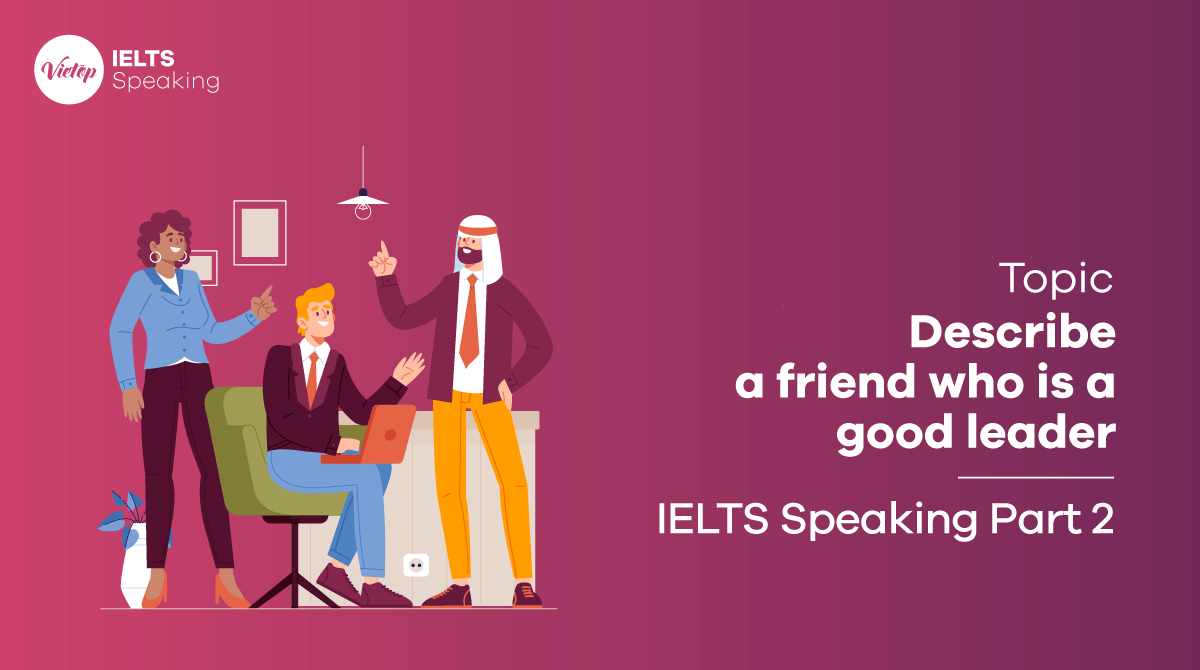
Sample
I’m going to tell you about a friend whom I met in university and she’s an example of a born leader.
Her name is Thao. And from the outside she seemed to be an ordinary college student. She’s of average height and has somewhat small stature. In school, she often wore trousers and a comfortable yet polite t-shirt. My first impression of her was that she was a reserved person so I assumed that she was very shy, unassertive. I couldn’t be more wrong.
I met her in a course about design and marketing in our freshman year, in which one of the most important exercises was to come up with a product and a marketing campaign. By chance, we were assigned to a group of four.
In our first meeting, I realised that I know very little about teamwork. My two other friends and I kept arguing about superficial issues and jumping aimlessly from ideas to ideas. Thao just sat and listened to us attentively for 10 minutes. Then, she motioned to us that she wanted to speak and with a confident and assertive voice, she carefully laid out a plan with specific milestones and dates.
She also proposes each of us to contribute based on our strength. For example, I was in charge of the design of the product because I was good at photoshop and Thao herself was responsible for researching the market. The three of us reluctantly accepted her leadership at first but were impressed with her dedication and decisions.
In the end, we passed this exercise as the best project. It’s been 2 years since I last saw her but I heard that she’s been promoted to a managerial position in her current company. I’ve learnt a lot from her and wish her the best in her career.
- A born leader: người có năng khiếu lãnh đạo, nhà lãnh đạo thiên bẩm
- Unassertive (adj): thiếu quyết đoán
- I couldn’t be more wrong: (thú nhận) tôi đã lầm.
- Be assigned to a group: được phân vào nhóm
- Superficial (adj): thuộc về bề nổi
- Aimlessly (adv): một cách lan man, không có định hướng
- Assertive (adj): quả quyết
- Milestone (n): cột mốc
- To propose (v): đề xuất
- Reluctantly (adv): một cách dè dặt
- Dedication (n): sự đóng góp, quyết tâm
Audio
IELTS Speaking Part 3: Leadership skills
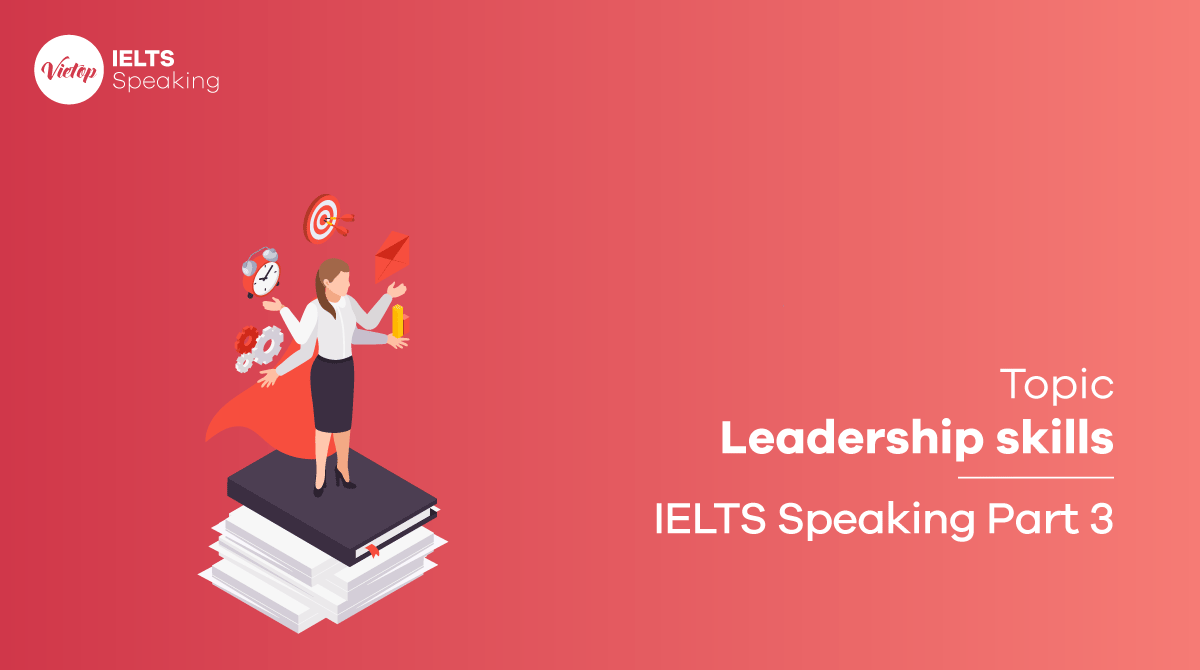
1. What are the main qualities of being a good leader?
To me, decisiveness, endurance and empathy are the most important traits of a leader. The reasons for choosing the first two qualities are quite obvious. As a leader, you need to make quick and accurate decisions. Sometimes, you even have to fend off the criticism of those decisions brought by others. Furthermore, in the last couple of years, the ability to empathise you’re your subordinates has been highlighted as a desirable quality in a leader. If you’re able to understand the struggles of other people who are working for you, naturally it will improve the effectiveness of your team.
- Decisiveness (n): sự quyết đoán
- Empathy (n): sự đồng cảm. To empathise (v): thông cảm, thấu hiểu
- To fend off (v + adv): chống lại
- Criticism (n): sự phê bình, chỉtrich1
- Subordinate (n): cấp dưới
2. Can leadership skills be taught? Why/ Why not?
Absolutely, much like a soft skill, say cooking, even for a person without any natural cooking talent can benefit from learning the basic techniques and coming out a better cook. There are so many aspects of leadership that can be taught to anyone such as logistics, plan making, communication and so on. I would go as far as saying even if you have some talents for leadership, you still need to be taught a lot about it.
- Technique (n): phương pháp, kỹ thuật
3. How does leadership apply to children at school?
School children are exposed to leadership every day. To them, their teachers are leaders who guide them and help them become better. Children also have loads of opportunities to practice leading others through group projects and sport games. So I’d say school is a good place for children to train and show their potential for leadership.
- To be exposed to: được tiếp xúc với
- Potential (n): tiềm năng
Audio
Đề IELTS Speaking Tháng 11/2022
Ngày 24/11/2022
IELTS Speaking Part 1: Fruits and vegetables
1. Do you like fruits and vegetables? OR Do you like to eat fruit(s) and vegetables?
Well in fact, I would have to say that I am pretty into them.
Precisely, I am mad about all kinds of berries, such as strawberries or raspberries, because they make scrumptious and nutritious snacks.
Additionally, citrus fruits are also my cup of tea. You know, oranges or tangerines are really refreshing and invigorating, especially on scorching summer days.
- Scrumptious (a): ngon
- Citrus fruit (noun phrase): quả họ cam chanh
- Tangerine (n): quả quýt
- Invigorating (a): cung cấp đầy năng lượng
- Scorching (a): nắng chang chang
→ Bài liệt kê hai loại trái cây hoặc rau yêu thích.
Chú ý các cụm từ để miêu tả sở thích.
2. How often do you eat fruits and vegetables?/ Do you often eat fruit(s) and vegetables?
In all fairness, I guess it depends really.
If I have some downtime, then I would probably go to a supermarket within walking distance from my house and shop for greens and fruits every other day. These would be preserved in my fridge for daily consumption.
On the other hand, if I am up to my ears in work, I would perhaps buy some bananas and munch on them whenever I can.
- Munch (v): ăn
→ Bài giải thích 2 trường hợp:
- Khi cùng rảnh thì mua ăn hàng ngày
- Khi bận thì không ăn đầy đủ
3. Do you think fruits and vegetables are important for us?
Frankly speaking, it is fairly vital when you consider that adequate intake of plant-based foods helps prevent numerous diseases since they are packed with lots of vitamins and minerals. Fruits and vegetables are even claimed to hold the key to longevity and anti-aging.
Yet, they should be kept in moderation, especially those fruits which are high in sugar, like durians. Overconsumption could result in health problems.
- Adequate intake (noun phrase): khẩu phần ăn vừa đủ
- Longevity (n): sống lâu
- Moderation (n): điều độ
→ Bài giải sử dụng mô tuýp phân tích hai trường hợp:
- Tốt và lý do
- Một số lưu ý hoặc cẩn trọng
Học sinh có thể chọn liệt kê các lý do vì sao mình nên xem trọng việc ăn rau quả.
4. Do you like the same fruits and vegetables today as you did when you were a child?
Generally, there is a huge disparity in my taste.
Particularly, I was put off with pungent vegetables and fruits, like onions or durians. My palate was really down to sweet, umami, and cheesy only.
As I grow older, I learn to appreciate the other spectrum of flavors, including bitterness.
- Disparity (n): khác biệt
- Pungent (a): nặng mùi
- Palate (n): khẩu vị
- Umami (a): vị ngon
- Spectrum (n): nhóm/ chiều/ khía cạnh
→ Bài giải sử dụng mô tuýp liệt kê sự khác biệt hoặc giống như trong quá khứ và giải thích rõ ra.
Học sinh chú ý các từ miêu tả vị giác hoặc vị của món ăn.
Audio
IELTS Speaking Part 2
Describe your idea of making a good first impression in a job interview.
You should say:
- What it is
- How it would help in a job interview
- What ways would you do it in your job interview
And explain why you think it is a good first impression in a job interview.
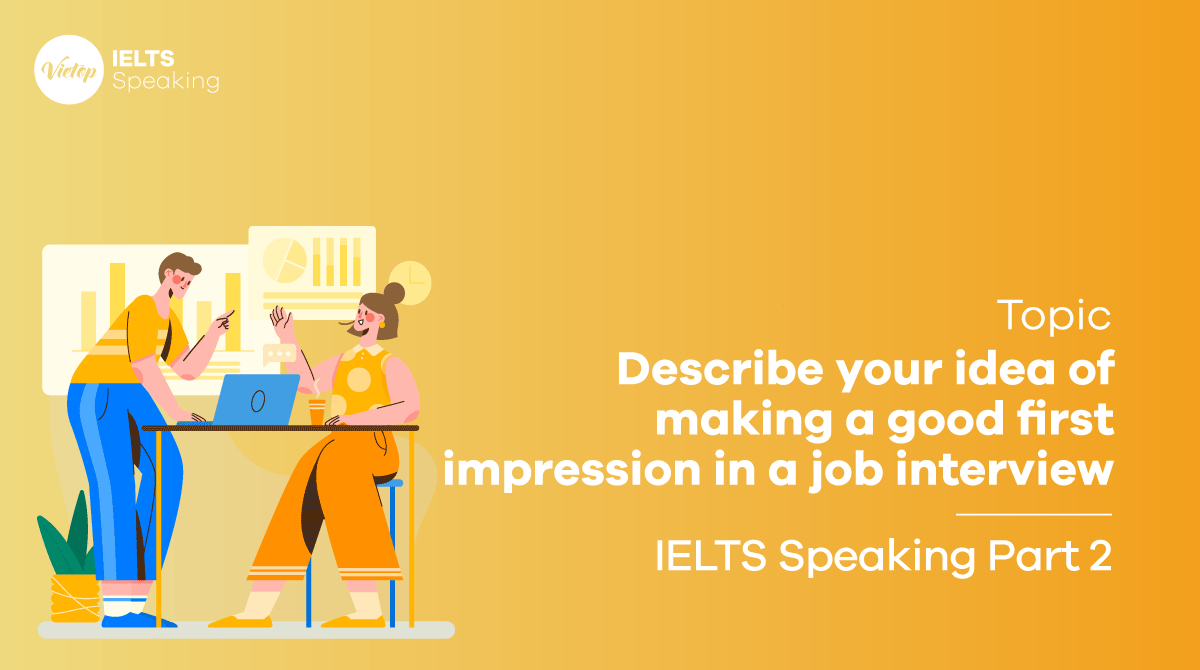
Sample
As you gave me the topic, there were a few tips that popped up in my mind.
Let me start the ball rolling by saying that preparation is of paramount importance. If a candidate wants to make it through the interview, they must be well-prepared for the questions. They are usually about the recruiting company and the candidate’s experience and expertise related to the occupation. Sometimes, there may also be situation-simulated questions or leisure ones. All of the asking and answering process is to find out more about their future employee beyond the description in the CV. By practicing those questions in advance, the job seeker will be able to show his or her intelligence and emotional quotients.
Moreover, professional manners are also worth taking into consideration. It could be as simple as being on time for the interview or dressing properly. A well-ironed shirt or a vest would sharpen your look. Additionally, it could be as detailed as having a pen with you or turning off your phone during the session. These are to make sure that you will be able to represent the company with their business partners
In a nutshell, it is definitely crucial to prepare and pay attention to your disposition for the interview.
- Of paramount importance (phrase): quan trọng hàng đầu
- Make it through (phrase): vượt qua
- Recruiting (a): tuyển dụng
- Situation-simulated (a): giả định tình huống
- Emotional quotient (noun phrase): chỉ số thông minh cảm xúc
- Manner (n): hành vi cư xử
- Sharpen your look (verb phrase): làm vẻ bề ngoài tươm tất hơn
- Disposition (n): cách cư xử
→ Bài giải miêu tả các nội dung về hai mẹo khi đi phỏng vấn: chuẩn bị và cách ứng xử. Thí sinh có thể chọn liệt kê hai mẹo của riêng mình và giải thích rõ.
Audio
IELTS Speaking Part 3: Work
1. Which do you think is more important at work, colleagues or work itself?
Honestly, it is obviously fundamental to put your work first and work your fingers to the bone because this may affect your income and promotion in the future.
But you also have to understand that having a good relationship with your co-workers may be an ace up your sleeve when teamwork defines your personality and cooperation.
- Put your work first (phrase): đặt công việc trên hết
- Work your fingers to the bone (idiom): làm việc cật lực
- An ace up your sleeve (idiom): lợi thế lớn
Bài giải liệt kê 2 mặt xem trọng công việc và đồng nghiệp.
2. Is there some other kind of work you’d rather do?
Well in truth, I am quite into a few jobs instead of being a teacher.
Firstly, I am interested in becoming a geriatrician, you know. It always irritates me when I find out how little people care for both physical and mental health among the elderly. This came when I first read a book related to this field about ten years ago.
Secondly, I would love to become a cake decorator. I really want to lighten up someone’s special occasion with an elegantly designed cake. You know, I am pretty good at making surreal flowers out of buttercream.
- Geriatrician (n): bác sĩ lão khoa
- Irritate (v): gây khó chịu
- Lighten up (verb phrase): làm một ngày của ai đó vui lên
- Surreal (a): giống như thật
→ Bài giải liệt kê hai nghề nghiệp mình muốn làm. Nêu những kỹ năng cần có hoặc lý do tại sao mình chọn.
3. Which jobs would you say are most respected in your country?
Well based on my experience, there are a few well-praised professions in Vietnam.
However, I suspect that the most prominent would be doctors. You know, they are the ones that could save one’s life. Hence, the years of studying, internship, and experience are worth admiring.
Another job would be entrepreneurs, especially among the young. This would be because those businessmen could make a handsome amount of money, so everyone wishes to be successful like them. I mean who doesn’t want to live in the lap of luxury.
- Praised (a): được khen
- Internship (n): kì thực tập
- Entrepreneur (n): doanh nghiệp
- A handsome amount of money (phrase): rất nhiều tiền
- In the lap of luxury (idiom): sống trong nhung lụa
→ Bài giải đề cập hai nghề nghiệp được xem trọng nhất. Chú ý các từ thay cho “respect”.
4. Some people say it’s better to work for yourself than to be employed by a company. What do you think?
Well in all fairness, if you want to have something on your own or climb the social ladder, becoming a self-made successful businessman is the most practical way. You would be able to make your own decision and make a lot of money.
Yet, for those who are not born with a silver spoon in their mouth, they probably have to pull their socks up at some companies to save money and gain experience before starting up their own ventures.
- Climb the social ladder (idiom): leo lên vị trí cao hơn
- Self- made (a): tự thân
- Born with a silver spoon in their mouth (idiom): sinh ra ngậm thìa vàng
- Pull their socks up (idiom): làm việc cật lực
- Venture (n): kinh doanh
→ Bài giải đề cập hai khía cạnh phân tích hai trường hợp:
- Lý do tại sao nên làm riêng
- Trường hợp nên mình tư làm riêng
Audio
Đề IELTS Speaking Tháng 12/2022
Ngày 23/12/2022
IELTS Speaking Part 1
1. What kinds of transport do you take to go to work?
Most Vietnamese people take the motorbike, or scooter, as their everyday means of transport, and I am no exception. I think the scooter is the ideal choice for a person who is constantly on the go like I am, because the compact design makes it so easy to wend its way forward in the city’s gridlocks.
- I am no exception: tôi cũng không ngoại lệ
- Be on the go (adj): trên đường
- Compact design (n): thiết kế nhỏ gọn
- Wend one’s way forward: tiên lên phía trước
- Gridlock (n): kẹt xe, tắc đường
→ Thay vì chỉ nói về bản thân, có thể mở rộng thông tin bằng cách nói về mọi người xung quanh trước, sau đó lồng ghép bản thân bằng cách nói “I am no exception”. Nêu những ưu điểm của xe máy (nhỏ gọn, tiện lợi) khiến mình chọn nó là phương tiện lưu thông hằng ngày.
2. What will become the most popular means of transportation in your country?
I cannot foresee the future, but I believe vehicles that run completely on electric power will definitely gain popularity. As a result of the launch of electric bus lines, cars and motorbikes, gasoline-powered models would be supplanted in the next few years, I suppose.
- Gain popularity (v): trở nên phổ biến
- Launch (n): sự ra mắt
- Gasoline-powered (adj): chạy bằng xăng
- Supplant (v): thay thế
→ Xe chạy bằng điện sẽ dần thay thế xe xăng trong tương lai, nhờ sự phát triển của công nghệ.
3. Are there any transport problems in your city?
For sure. During the peak hours of the weekends and holidays, the traffic in HCMC is chaotic. Public and private transports commute on the same narrow lanes, causing serious traffic jams at between 5 and 6 p.m every evening.
Besides, though investments in road traffic have been made, the quality is often substandard, as some routes just need a light rain to be completely flooded and damaged. The exhaust fumes and loud whistles from vehicles are also causing fatigue and irritation for commuters during their travels.
- Peak hour (n): giờ cao điểm
- Chaotic (adj): hỗn loạn
- Substandard (adj): tệ, dưới mức tiêu chuẩn
- Flooded (adj): ngập
- Commuter (n): người tham gia giao thông
- Fatigue (n): sự mệt mỏi
- Irritation (n): sự khó chịu
→ Liệt kê một vài điểm tiêu cực của giao thông (kẹt xe, đường ngập nước, khói xe gây ô nhiễm, còi xe ồn ào…), lưu ý sử dụng những từ nối Besides, also để liên kết các ý, tránh rời rạc.
Audio
IELTS Speaking Part 2: Describe a time when you felt proud of a family member
IELTS Speaking Part 2: You should say:
- When it happened
- Who this person is
- What the person did
And explain why you felt proud of him/her.
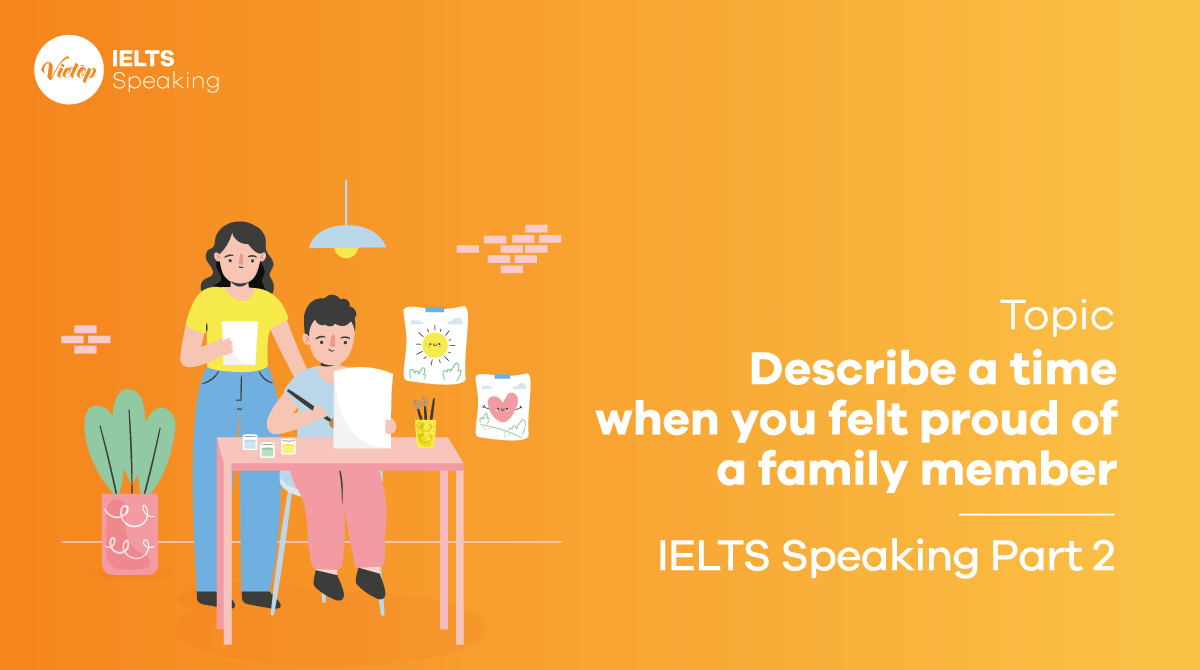
Sample
When I read this cue card, my little brother is the first person that springs to mind. He has always been the pride of my family and I’d like to talk about the time when he won a gold medal in the local junior science competition last year.
My 17-year-old little brother, Minh, has shown a keen interest in science since he was a child. He has always been a cut above in his class so I wasn’t surprised at all when he was chosen to showcase his ability in such competitions.
Minh was having a lot on his plate at the time, as he had to be well-prepared for the upcoming competition, while ensuring his academic performances in class. There were times when I saw him burn the midnight oil to finish all his homework and do extra reading, and though he kept saying that he was okay, I knew that he was under a lot of pressure.
On the day of the competition, our whole family came to encourage Minh and boost his confidence. He had to outperform over 100 other contestants, dealing with 100 nerve-racking questions ranging from Mathematics, Physics to Chemistry to get into the Final round. But not until he was announced to be the winner did the whole crowd reach fever pitch.
As soon as we heard the announcement, we couldn’t help ourselves but burst into tears and ran over to Minh to give him a tight embrace. There were tears of happiness in his eyes and he kept expressing his gratitude for us being by his side. Words could not describe how much we were all proud of him at that very moment.
Despite possessing an inborn talent, Minh always stays humble and shows an unparalleled dedication and stamina in everything he does. I am so proud of him, not just because of the gold medal he had achieved, but the time and effort he invested were what actually mattered.
- Spring to mind: xuất hiện ngay trong đầu
- Show a keen interest in s.th: thích thú
- A cut above (n): người vượt trội hẳn so với những người khác
- Have a lot on one’s plate: bận rộn
- Burn the midnight oil: thức đêm học bài/ làm việc
- Nerve-racking (adj): căng não
- Reach fever pitch: vỡ oà, chạm đến cao trào
- Burst into tears: bật khóc
- Embrace (n): cái ôm
- Gratitude (n): sự biết ơn
- Inborn talent (n): tài bẩm sinh
- Unparalleled (adj): không thể sánh bằng
- Dedication/ stamina (n): lòng quyết tâm
→ Bài nói dựa trên việc chiến thắng cuộc thi khoa học, từ đó bộc lộ được những phẩm chất tốt của người em trai (giỏi giang, chăm chỉ, khiêm tốn, luôn cố gắng hết sức,…) đã khiến mình cảm thấy tự hào.
*Lưu ý luôn bám sát câu hỏi gợi ý để tránh sa đà: When it happened (last year); Who this person is (brother – Minh); What the person did (won a gold medal); Why you felt proud (he’s talented, humble, determined,…)
Audio
IELTS Speaking Part 3: Feeling proud
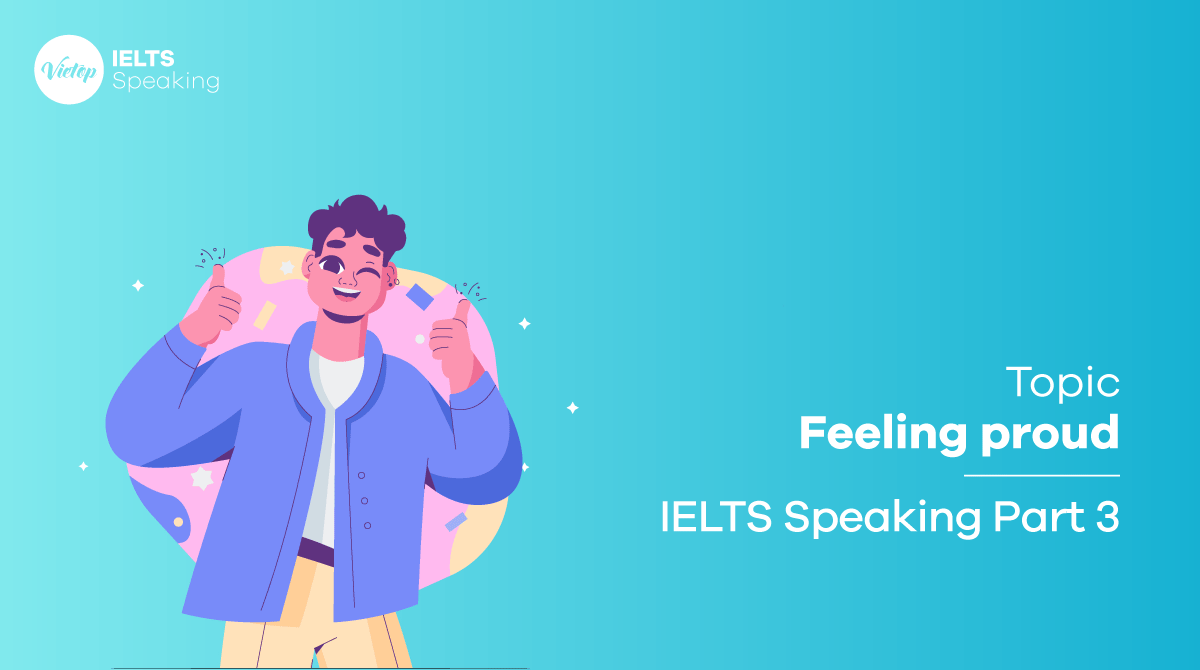
1. When would parents feel proud of their children?
The way I see it, parents are proud of children when they achieve their own goals, whether it be saying their first word, taking their first step, getting an A in class, graduating from college, getting their first job, or buying their first house. Parents, in general, develop a sense of well-being seeing their children mature every day, and no matter how big or minor the achievement might be, they are deliriously happy. That is, undoubtedly, the beauty of parental love.
- Sense of well-being (n): cảm giác hạnh phúc
- Mature (v): trưởng thành
- Deliriously happy (adj): vô cùng vui sướng, hạnh phúc
→ Liệt kê vài hành động của con cái khiến cha mẹ tự hào, và khẳng định rằng dù thành tựu đó lớn hay nhỏ cũng đều khiến cha mẹ cảm thấy vui và hạnh phúc.
2. Should parents reward children? Why and how?
Yes, definitely. Parents should reward their little ones for their achievements and hard work. A little pat on one’s back suggests that their effort has been recognized, and this would develop a sense of achievement among children, encouraging them to keep up the good work in the future. Parents see rewards as a way to get kids going in the right direction on the path to establishing good habits. The reward shouldn’t necessarily be money or material goods, but parents can reward children by showing them affection, praising them, or giving them extra time with a favorite activity.
- Pat on one’s back: cái vỗ lưng (ý chỉ hành động khen)
- Sense of achievement (n): cảm giác đạt được thành tựu
- Affection (n): tình yêu thương
- Praise (v): khen ngợi
→ Câu hỏi gồm 3 ý lớn, nên cần trả lời đầy đủ cho cả 3: Khẳng định có/ không; Giải thích lý do vì sao (động viên con trẻ, giúp trẻ có thêm niềm vui từ đó tiếp tục những thói quen tốt,…); Gợi ý cách thức (thể hiện tình thương, khen ngợi, cho trẻ làm những hoạt động yêu thích,…)
3. Is it good to reward children too often? Why?
Well, it is true that there are things regarded as personal responsibilities. It is thought by many people that giving rewards too often for achievements children “should do anyway” may undermine such duties and open up having to negotiate constantly with kids. They certainly don’t need rewards for every single good behavior or every small task they perform.
However, as I said, there are plenty of rewards that don’t cost any money. Free rewards and incentives are just as effective in providing motivation for kids. Allowing children to earn a later bedtime, choose a special meal or pick a game to play is enough to make them feel on top of the world.
- Undermine (v): phá hỏng, đục khoét
- Negotiate (v): đàm phán
- Constantly (adv): liên tục
- Be on top of the world: cảm thấy cực kì vui sướng
→ Nêu ra những tác động tiêu cực của việc thưởng cho trẻ quá thường xuyên (làm trẻ mất tính trách nhiệm, dựa dẫm vào vật chất,…). Tuy nhiên có thể mở rộng ý theo hướng phần thưởng không nhất thiết phải là tiền/ hiện vật mà còn được thể hiện dưới những dạng giá trị tinh thần khác.
4. On what occasions would adults be proud of themselves?
Each individual has different accomplishments worth celebrating, in different aspects of their lives. Some people believe that they should only be proud of themselves when achieving something “big” enough, like getting a promotion, buying a new car or being able to afford an expensive designer bag.
However, I suppose there are a lot of simple reasons to be proud of yourself, such as learning and growing from your mistakes, lending a helping hand for those in need, or simply how you strive for your definition of success. Both big and small accomplishments are worth acknowledging as they are the reasons one has come so far in life, and people should always feel proud of themselves for all the good deeds they do, whether to themselves or the world around them.
- Lending a helping hand: giúp đỡ
- Acknowledge (v): công nhận
→ Liệt kê những lý do người ta có thể cảm thấy tự hào về bản thân, dù lớn hay nhỏ. Từ đó khẳng định tầm quan trọng của việc trân trọng những giá trị cá nhân.
Audio
Việc luyện tập và tham khảo các bài giải đề thi IELTS Speaking 2022 không chỉ giúp bạn làm quen với dạng câu hỏi, mà còn hình thành tư duy trả lời mạch lạc và nâng cao khả năng ứng biến trong phòng thi.
Hy vọng bộ giải chi tiết này sẽ trở thành tài liệu hữu ích, giúp bạn tự tin hơn trên hành trình chinh phục band điểm mơ ước. Hãy bắt đầu luyện tập ngay hôm nay để biến kiến thức thành kỹ năng thực chiến trong kỳ thi IELTS sắp tới!

